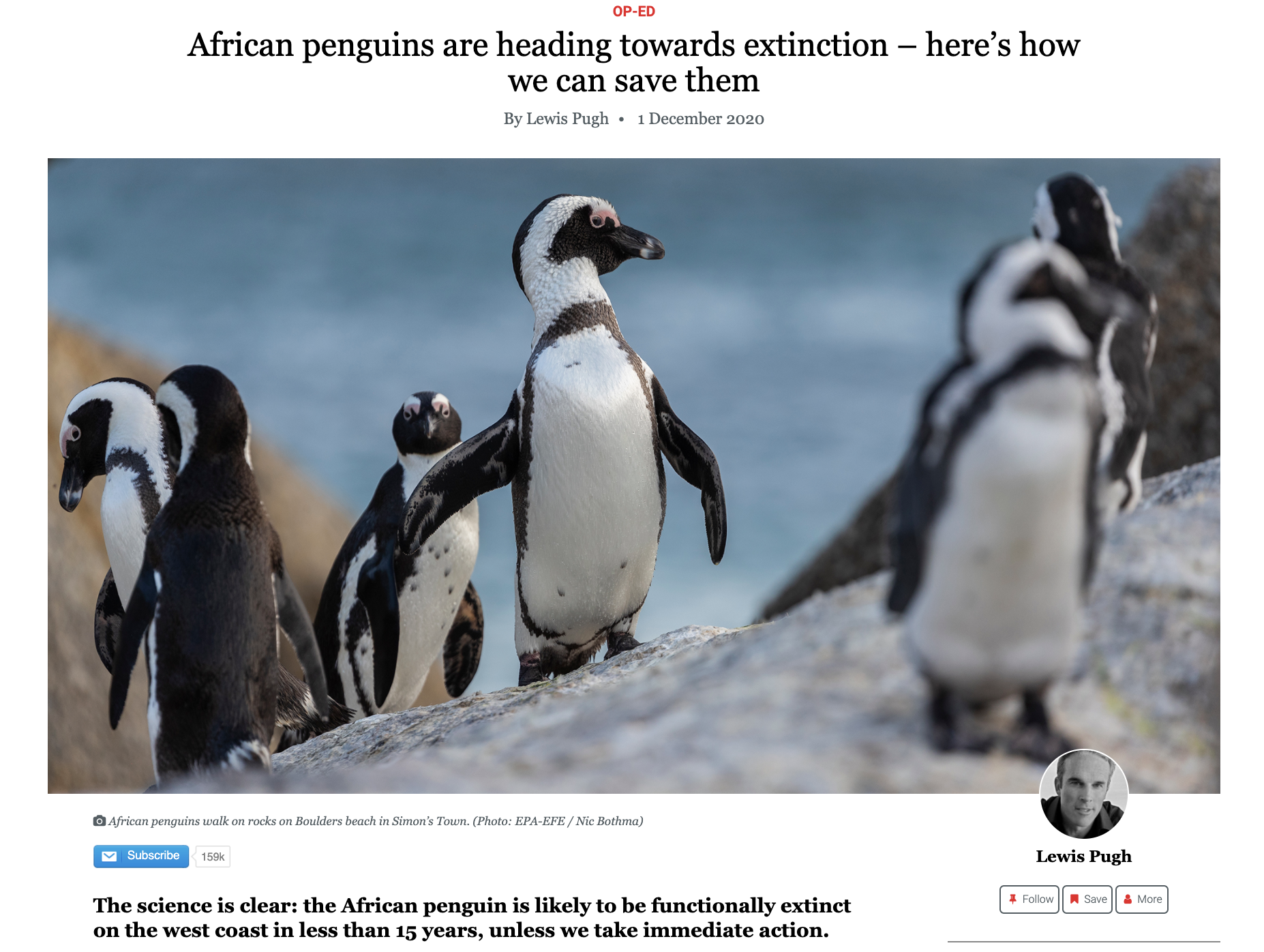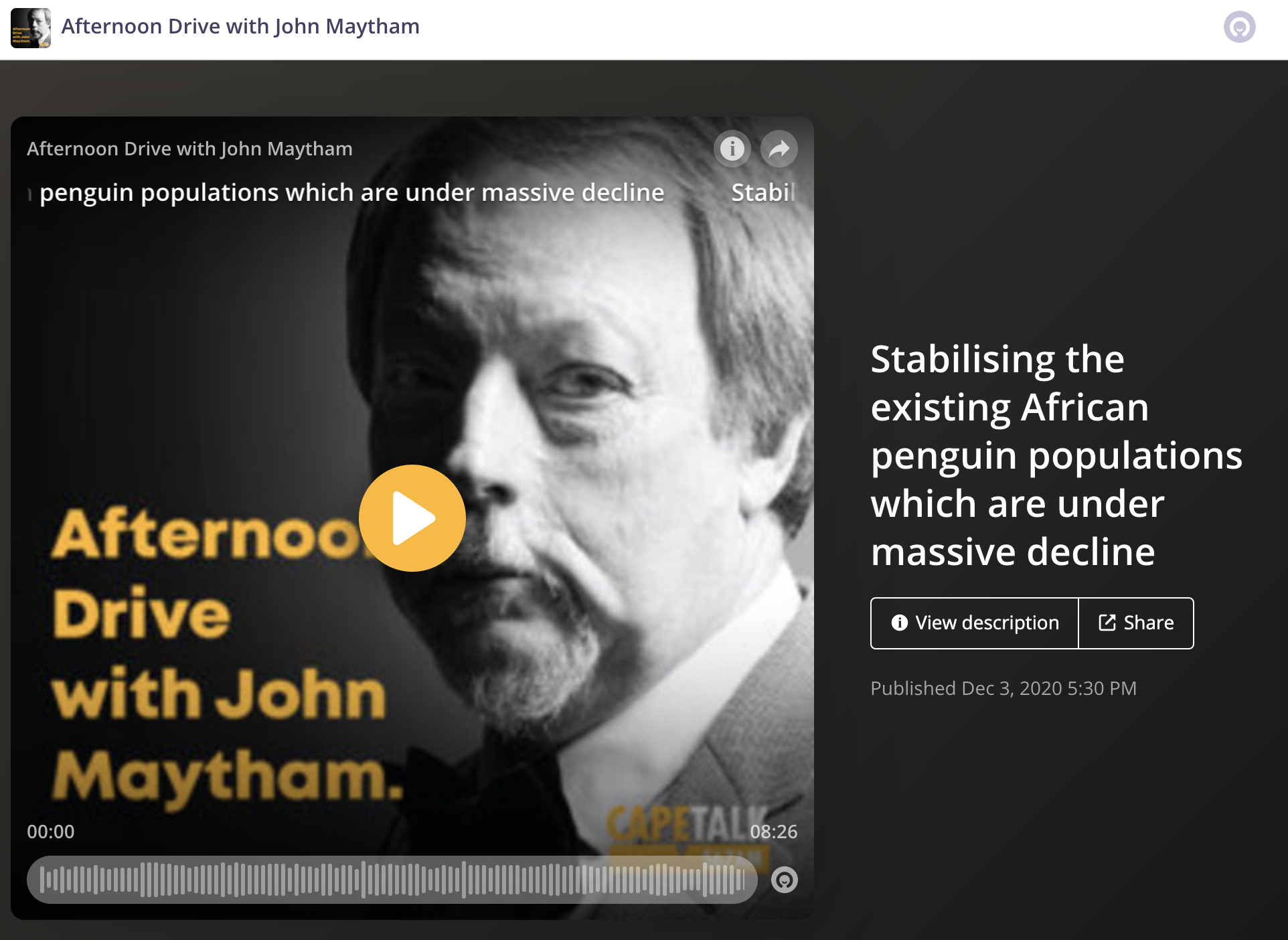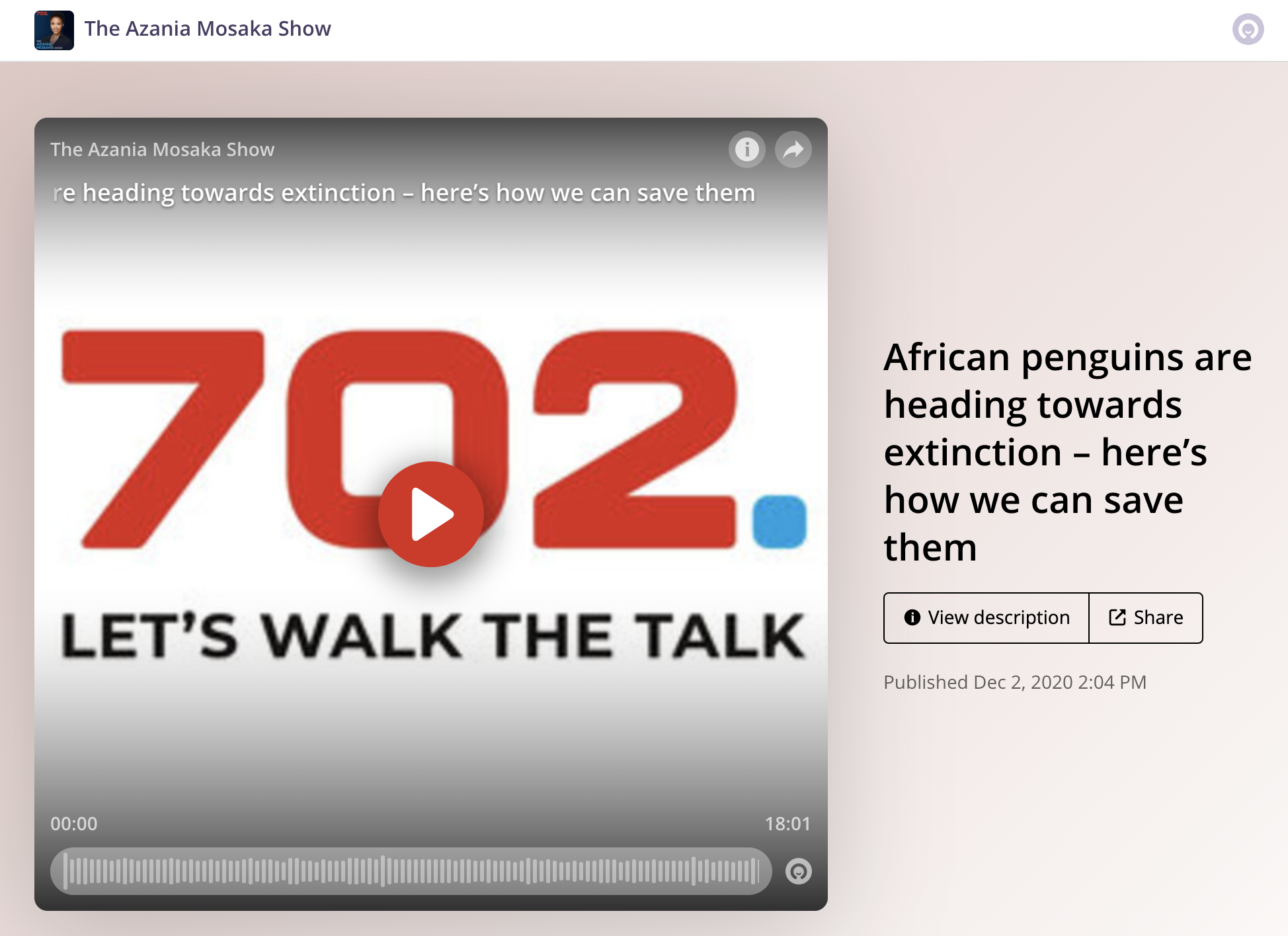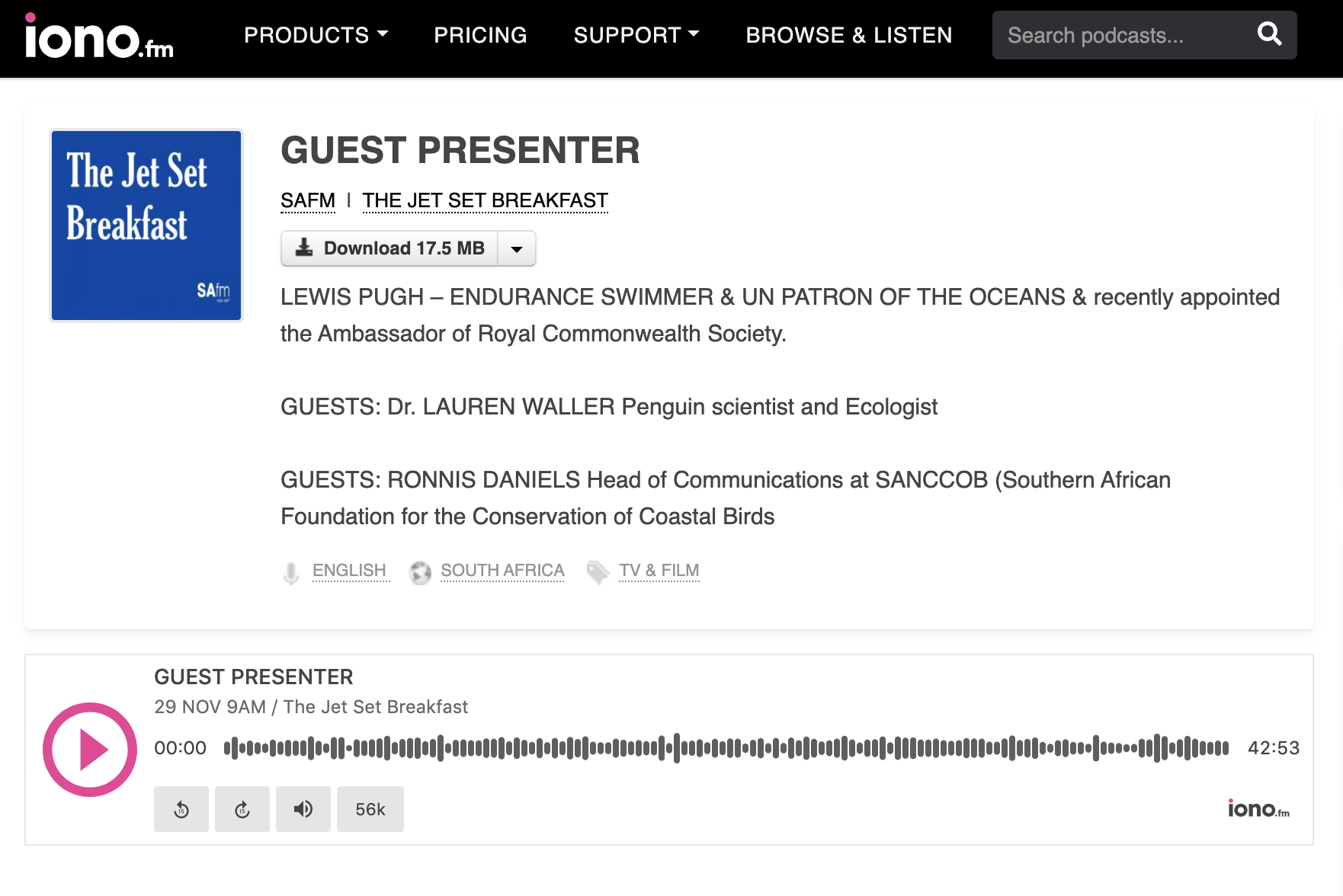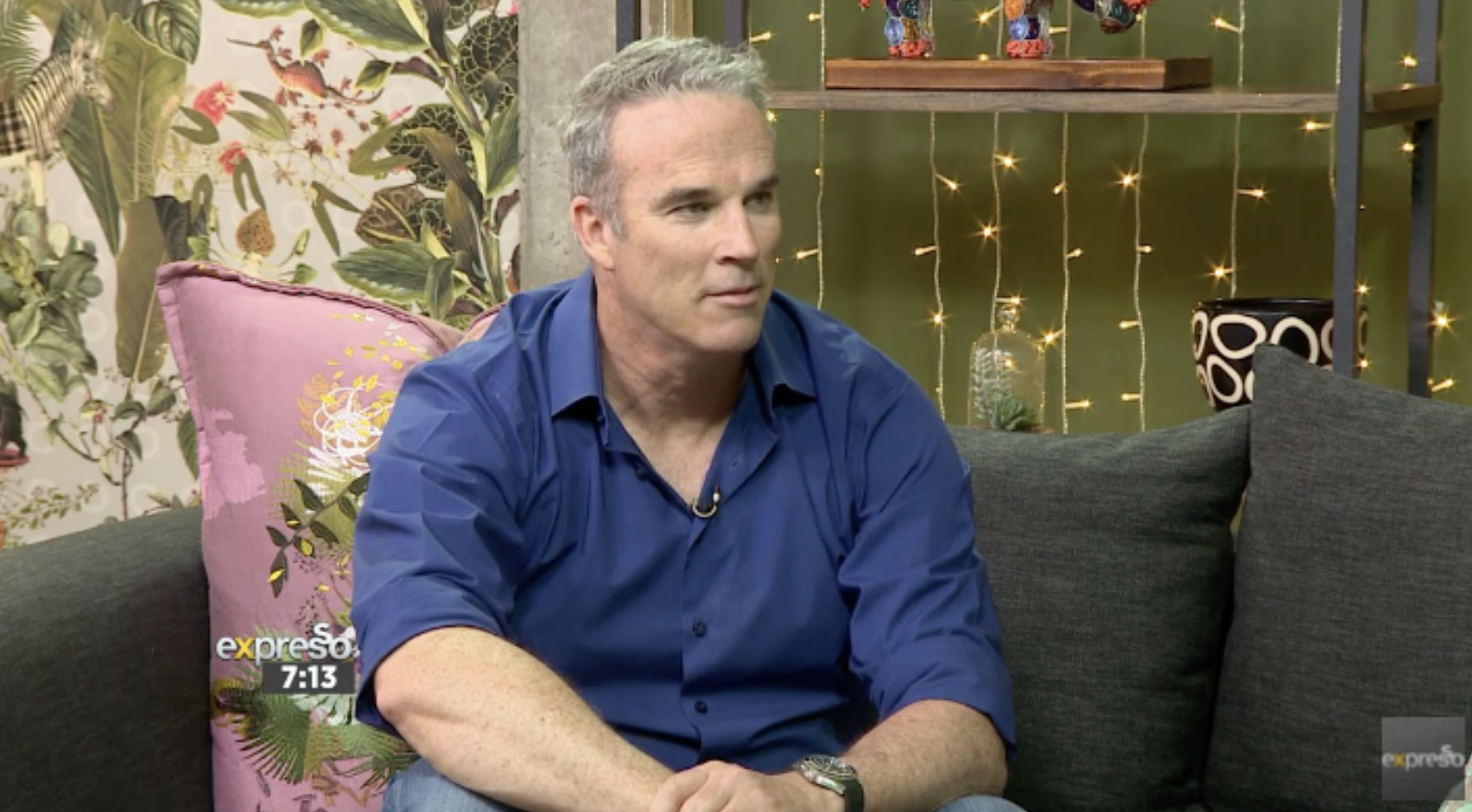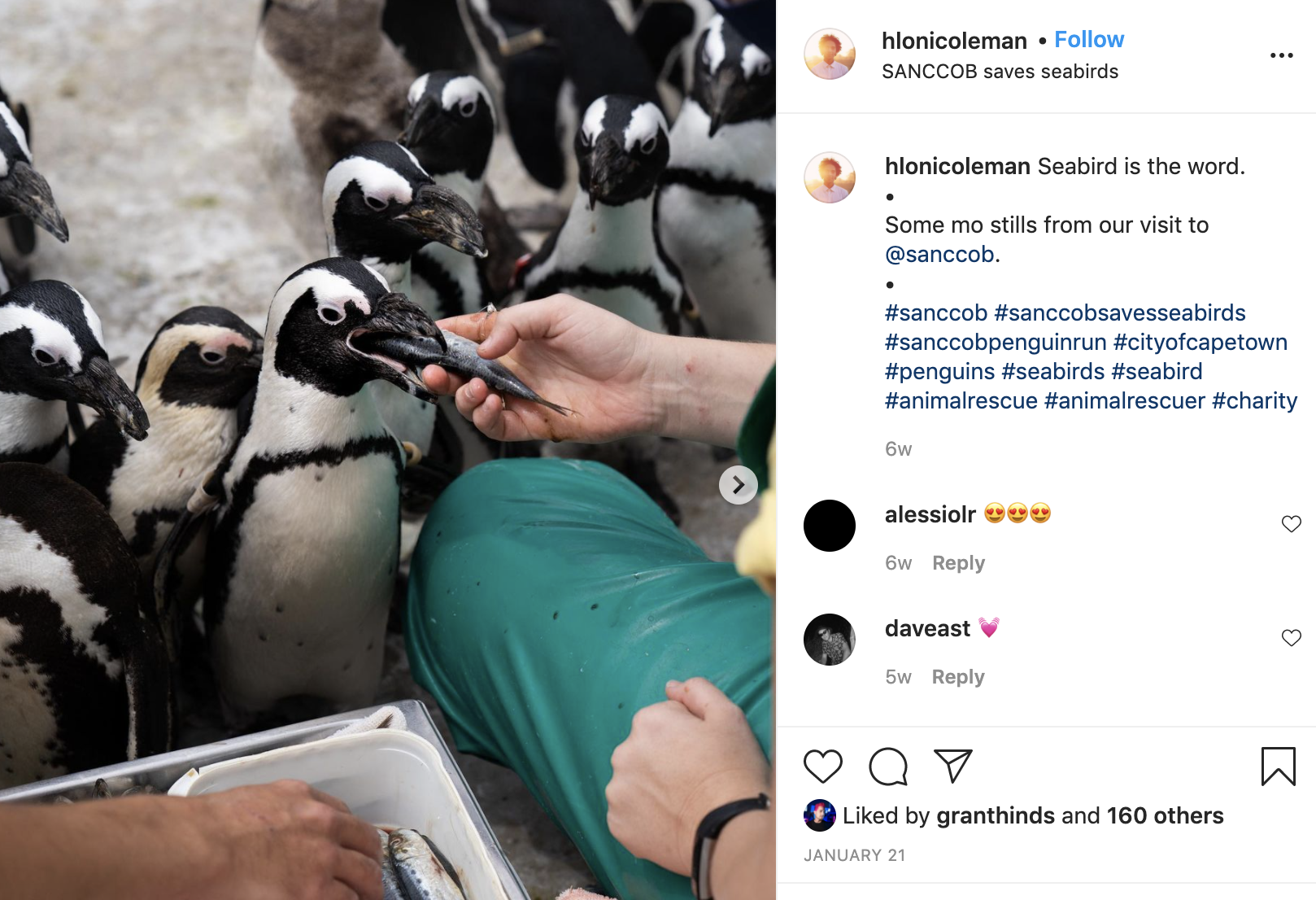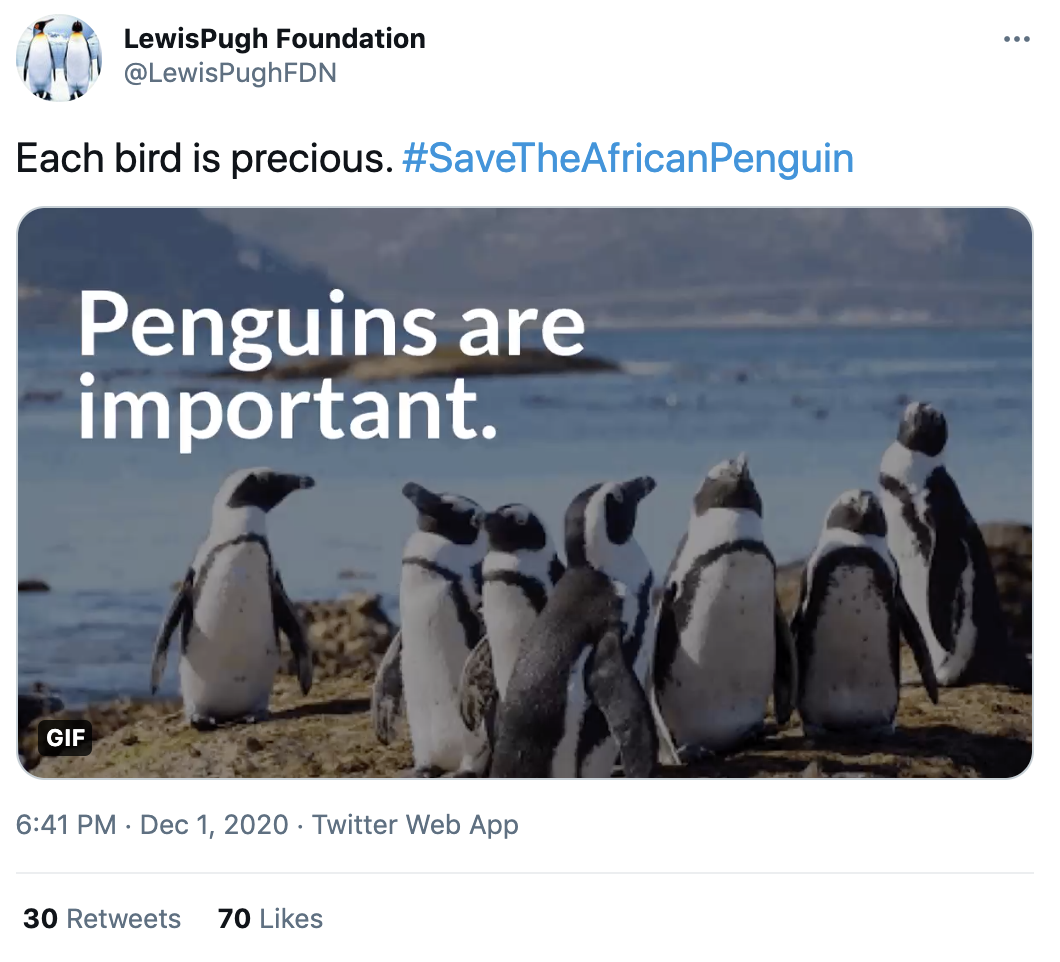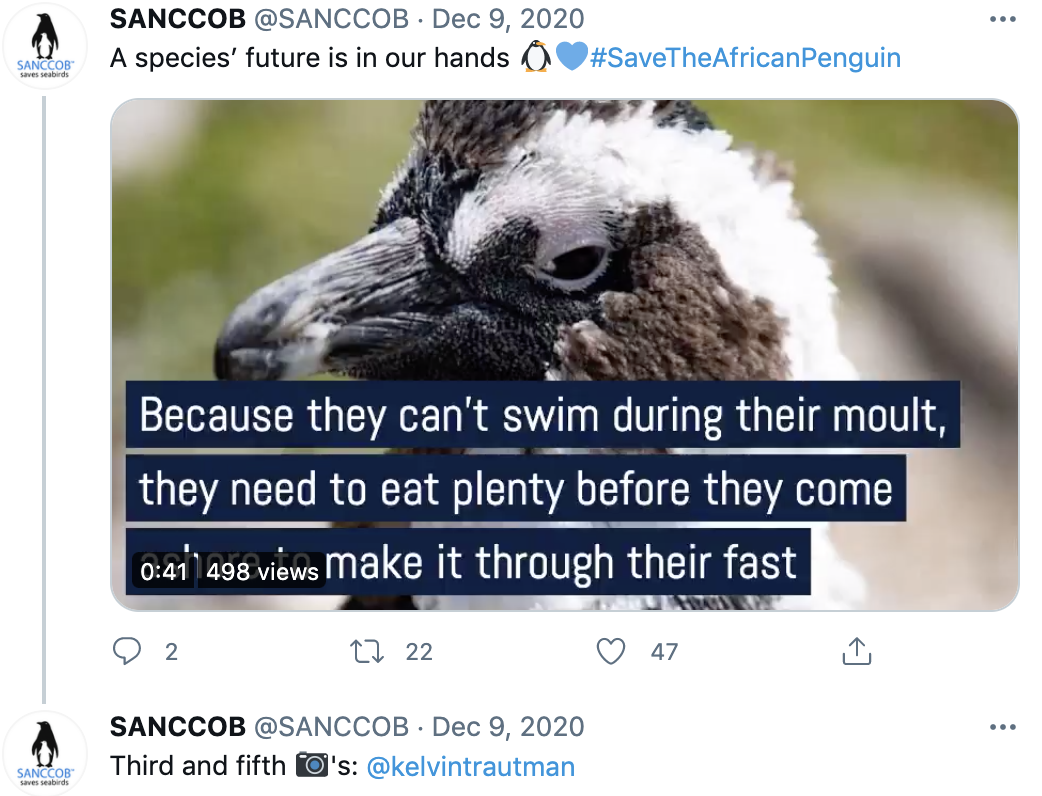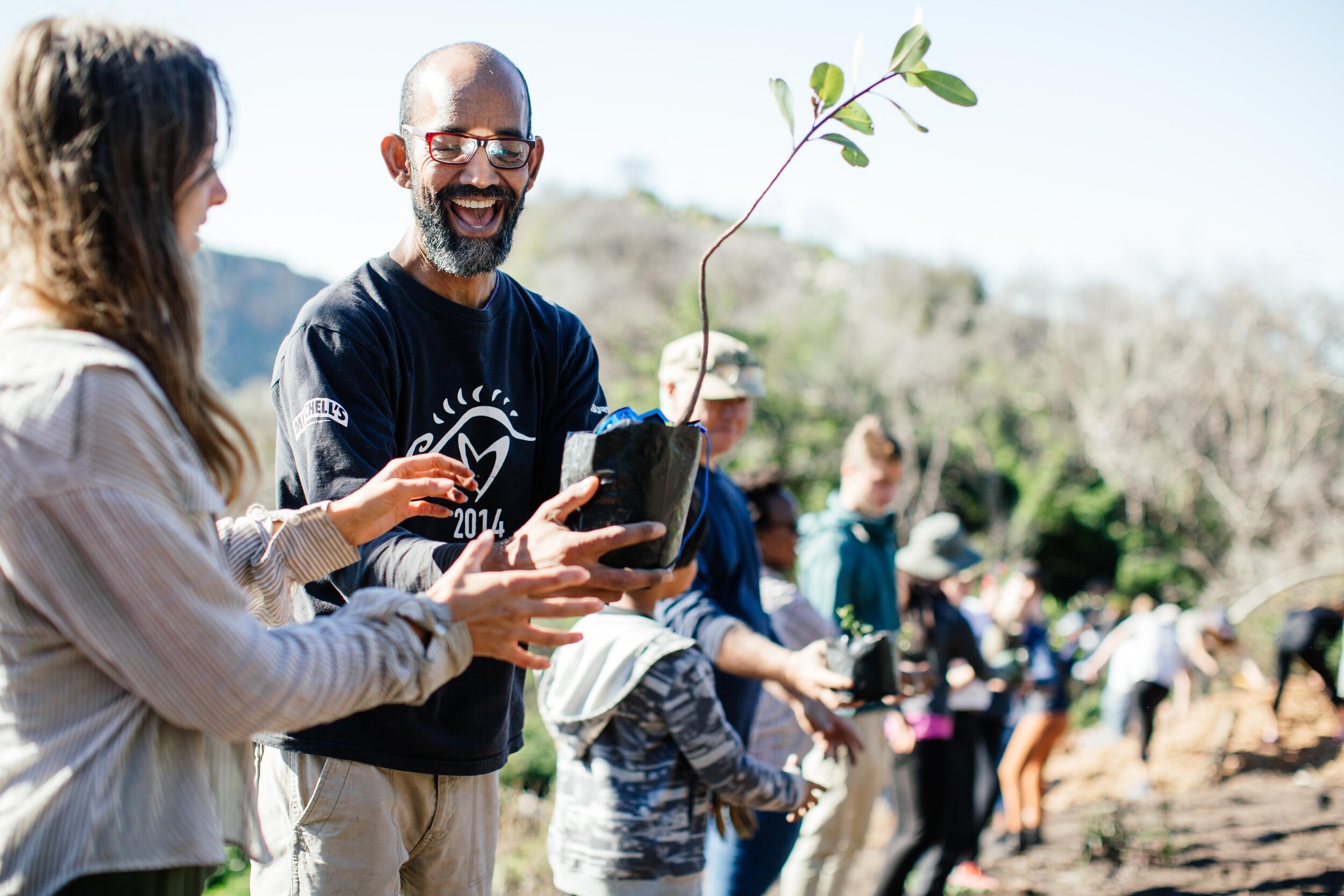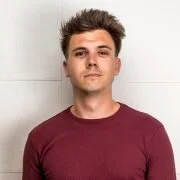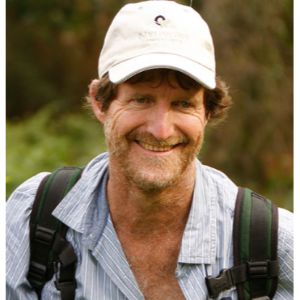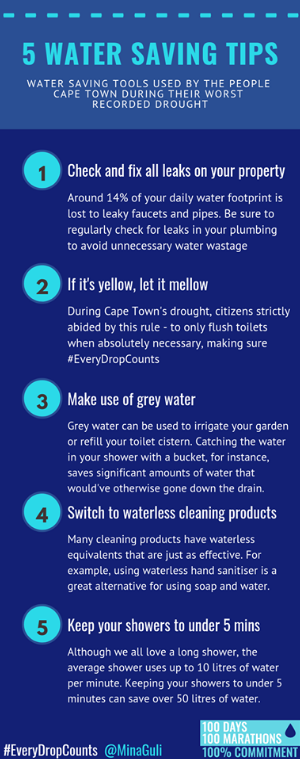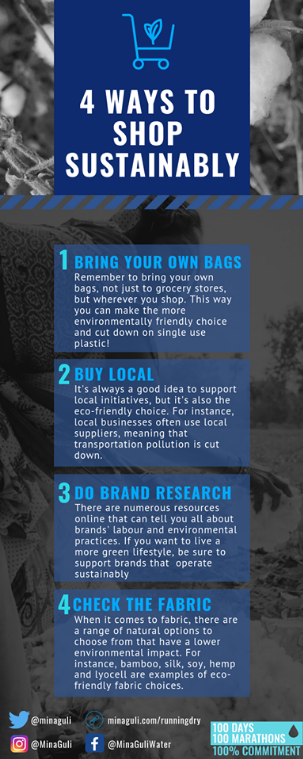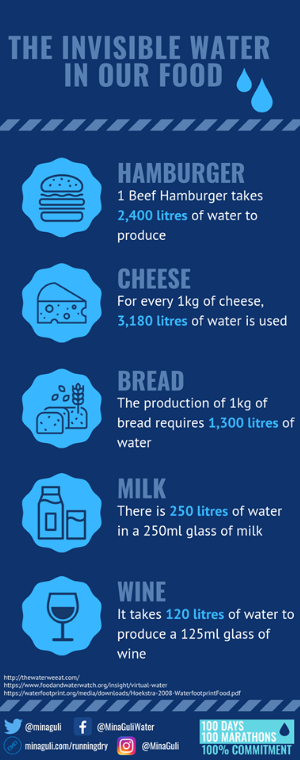Advocating for youth in Africa’s peace and security agenda #WhatMakesYouthFeelSafe
Working with ISS Africa we activated young peace-builders in 20 African countries; and gained lifelong lessons on community, leadership and the importance of incorporating play in work.
Written by Sandiso Matshikiza, Graphics by Schalk van der Merwe
In March 2021, we came together with the Institute for Security Studies for what seemed like a simple and straightforward project on Youth, Peace and Security. Activist Aya Chebbi was approaching the end of her two year term as the African Union’s first Youth Envoy, so we wanted to reflect on her work and ask the question “What’s next for Africa’s Youth Peace and Security agenda?”
The conclusions that we reached during our reflection process revealed some startling insights:
42% of the world's youth will be African by 2030, yet little is being done to equip young leaders on the continent. The African Union, whose mandate is to cover Youth Peace and Security among its other agendas, seems detached from the needs of the youth on the ground. Constantly excluded from key decisions and represented by leadership who are much older, African youth do not feel safe and they do not feel heard.
So what did we do?
With these daunting facts, we saw an opportunity to crowdsource the perspectives of youth from all over Africa to understand: What makes youth feel safe? What makes youth feel unsafe? What made this campaign special was that we took a simple question of safety in one's community, easily answerable by a small child, and used it as a line of communication between African youth and AU leaders. By answering the question, African youth were directly influencing the next steps for the African Youth Peace and Security (YPS) agenda.
We kickstarted the campaign with a WhatsApp group to discuss the topic. Working with ISS lead researcher, Munei Kujeke, we convened over 130 young peace builders in more than 20 African countries.
Whilst the official platforms for the campaign were Twitter, Facebook and Instagram, it was on our WhatsApp group where the conversation unfolded organically. We worked with these young people to turn their statements into videos, which eventually spilled over onto other the other platforms. As the week progressed, there was an outpouring of videos from all over Africa, with youth bravely speaking out on issues such as the importance of good governance, the scourge of gender based violence and the need for inclusivity and opportunities across all youth groups.
“Hearing multiple perspectives, in different languages with different cultural backgrounds, united through a noble purpose, is a feeling that can only be described as spiritual.”
With an organic reach of over 548 000 people, the #WhatMakesYouthFeelSafe campaign clearly struck a chord. From the first sprouts of debate on the WhatsApp group, right up to the peak of the conversation during the round-up seminar - the conversation was rich, vulnerable and gave all those involved a genuine sense of belonging and importance. Accordingly, it came as no surprise when we learned that the campaign had caught the eyes of broadcasting channels such as eNCA and Big Daddy Liberty who invited lead researcher Muneinazvo Kujeke for interviews.
Behind the scenes: Key challenges and breakthroughs
Behind the scenes, the campaign did not come without its challenges. A major technical obstacle that we came across was the realisation that although the call to action had been for videos, not everyone involved in the campaign had access to bandwidth. So as the week progressed, we improvised and included posters and text messages as part of the conversation.
For the community manager and interaction designer on the account, this was a debut campaign which we playfully describe as a ‘baptism of fire’.
“My personal breakthrough was when engagement with the initial videos was very low and people were just not joining the conversation. I realised the value of my vulnerability and the need to honour my responsibility as African youth. So I grabbed a pen and board and I added my voice.”
Our team saw its defining moment, however, as we approached the campaign round-up seminar and Schalk surprised us with a short clip which showed all the faces of the youth who had participated in the campaign. This strategic move shifted the energy of the campaign and raised the commitment levels of the participants significantly- showing us that before issues are unpacked, the affected parties value being seen and acknowledged.
So, in a campaign that was meant to bring attention to Africa’s Youth Peace and Security agenda, we managed to reach youth across the continent and got them to raise their voices on critical issues which affect them and their ability to flourish.
For us, some of the key learnings were:
The importance of an authentic engaging conversation behind a public mobilization;
The importance of leading by example, and showing community members how to participate.
The importance of supporting and acknowledging participants so they feel heard. Whether by responding to them on social media, or featuring them in the content directly.
#WhatMakesYouthFeelSafe carries lifelong lessons on community, leadership and the importance of incorporating play in work.
Working Together to #SaveTheAfricanPenguin
Treeshake partnered with SANCCOB and the Lewis Pugh Foundation to secure national media coverage, and reach over 1m people on social media to alert South Africans about the urgent need to #SaveTheAfricanPenguin.
How do you get the media to pay attention to the steady population decline of the African Penguin amidst a global pandemic and rising unemployment? SANCCOB, The Lewis Pugh Foundation, and Treeshake came together to achieve more together than any one organisation could do alone. In under two weeks we secured coverage from mainstream South African media platforms - including The Daily Maverick, Expresso, Cape Talk, 702, SAfm, The Herald Live - and reached over 1 million people reached on social media and many more on radio and TV.
A collaboration to Save Seabirds
The Southern African Foundation for the Conservation of Coastal Birds (SANCCOB) is an organisation that has been dedicated to saving seabirds since its establishment in the late 1960s. Fifty-three years on and the centre is still leading African penguin rehabilitation and rescue in Southern Africa.
SANCCOB does not do it alone however, having successfully pulled off mammoth seabird rescues with help from their dedicated volunteers and various supporters. One of which is Lewis Pugh, UN Patron of Oceans and endurance swimmer.
In November 2020, Treeshake worked with SANCCOB and the Lewis Pugh Foundation to share a simple message: African Penguins are at risk of functional extinction, we need to do everything we can to save them. During the two-week campaign, Treeshake ran the media, digital, and PR for #SaveTheAfricanPenguin campaign to raise awareness on the plight of the African Penguin.
Photo: Kelvin Trautman
Giving the African penguin a fighting chance
Every year African penguins moult. This generally occurs November through to January, where birds stay ashore for up to three weeks shedding and regrowing their protective feathers. Towards the beginning of moulting season, Lewis Pugh had the opportunity to drive out to Stony Point, one of South Africa’s largest and most successful African penguin breeding colonies to assist SANCCOB with a release of rehabilitated penguins. Scanning the colony, Lauren Waller, a SANCCOB marine scientist, started pointing out birds to Lewis that weren’t likely to make it in the coming days. Fat, plump birds is what Lewis and Lauren should have been seeing on that rocky shoreline. Instead, they saw malnourished penguins with their breast bones sticking out. To quote Lewis Pugh’s OP-ED in the Daily Maverick:
“I’ve visited penguin colonies all over the southern hemisphere, but until now, I’ve never seen a starving penguin. It was eerily reminiscent of the malnourished polar bears I’ve seen in the north.”
Photo: Kelvin Trautman
Saving the African penguin hinges on several factors. One of which includes shifting offshore bunkering away from penguin colonies and another which involves ensuring that vessels are prepared in the event of an oil spill. A third factor, on which the campaign mobilised, is one of the biggest threats facing the iconic bird - having to compete with fishing companies for food, and losing.
As various review panels, international and local, were set to meet and discuss island closures and purse seine fishing around colonies in December, this was the perfect time to get going. The campaign came together within days and our team, running on a very tight timeline, and with a lot of technical information, started working intensively with SANCCOB to make sense of all the facts and produce compelling content that would get people engaged.
Building up a base of support for island closures
A varied content plan and core thematic pillars would be crucial if we were to get through all the important points and keep our audience engaged. We knew that at the heart of the campaign, a love for these unique birds would be vital. From this, one of our three core pillars was formed - ‘we can’t afford to let this happen’. By highlighting the role African penguins play in our marine ecosystem, how they create jobs, are unique and extraordinary and form part of our national heritage and brand, people would start to grasp their far reaching importance. This gave us a solid foundation from which to message on our second pillar - ‘the African penguin is at risk of functional extinction.’
Since our audience was now invested in the story of the African penguin, our focus shifted to making SANCCOB’s nuanced scientific facts and numbers accessible to our audience. What was left was something actionable - steps that could be taken to save the African penguin. This brings us to island closures, our third pillar, where we unpacked no-take fishing zones and how crucial actions from our government could make all the difference to the bird’s survival.
Over the course of the campaign, the Lewis Pugh Foundation dedicated their social media accounts to the 'Save the African Penguin' cause. On both SANCCOB and LPF socials, a rich variety of content was produced - from infographics, GIFs and videos to fact threads and waveform podcast videos.
We also identified some of the most influential voices among the tourism industry, avid penguin lovers, animal activists and seabird scientists whom we encouraged to get involved. To make participation easy, we produced a pack of African penguin facts and insights coupled with photographs that we distributed to our influential voices on social media.
These relationships were a key driver of the campaign’s success and later made it possible for us to organise an influencer event that spanned over a week. Artists, photographers, videographers and streamers - all visual storytellers - visited the SANCCOB facility where they toured the centre and learnt about what it takes to bring different seabirds back to full health. Our influencers shared their days on their social media accounts, spotlighting the important work SANCCOB does as well as the plight of the African Penguin as a whole.
Photo: Hloni Coleman
We secured Lewis Pugh three prime-time in-depth radio interviews (on Cape Talk, 702 and SAfm) focusing on the plight of the African Penguin in the Western Cape. Lewis also appeared on SABC 3’s Expresso Morning Show to talk about the campaign and wrote an OP-ED in the Daily Maverick on the main threats facing the African penguin, which we helped refine and place. The piece unpacked the decline of the African Penguin and detailed a three-point action plan to save the species.
Results
From the get-go, the #SaveTheAfricanPenguin campaign showed the importance of collaboration, and how when organisations come together around a shared purpose we can all extend our reach and impact. This was reflected by consistently high social engagement on both the Lewis Pugh Foundation and SANCCOB’s Twitter, Instagram and Facebook accounts. As a result of growing engagement, consistent community management and tagging across all accounts, SANCCOB’s social media engagement rates rose.
In just over 2 weeks, we reached over 1.5 million people, with 16 000 interactions on SANCCOB’s accounts and over 1594 mentions. SANCCOB’s social media pages grew too, with their Twitter account seeing double their usual amount of new followers in December.
Photo: Kelvin Trautman
Our end goal was to reach the South African Department of Environment, Forestry and Fisheries and encourage Minister Barbara Creecy to implement full island closures for 10 years to allow the penguin population to recover. And while the minister did engage with the issue, the islands have only been partially closed.
The purse-seine fishing industry continues to push back on conservation efforts and so we know this conversation needs to continue. The local chapter of Extinction Rebellion has now taken up the charge. If you care about this issue please sign their petition here.
South African eco-organisations to watch — and actively support
Trying to decide which environmental organisation to support in 2020? Here are the ones who are tangibly making a difference - and could use as much support as possible to continue effecting change.
Trying to decide which environmental organisation to support in 2020? Here are the ones who are tangibly making a difference - and could use as much support as possible to continue effecting change.
By Bridget McNulty
There’s a strange disparity in South Africa at the moment. Or should I say, another strange disparity. There appears to be an almost visible line between those who are facing up to the environmental crisis that we are in the middle of, and those who are not willing to sense the enormity of the problem.
As journalists get more and more frank, and scientists get more blunt (11,258 scientists from around the world have called for drastic climate action to “avoid untold suffering”), there are still those who are unable - or unwilling - to accept that now is the time to take action. Not just to watch from the sidelines, but to step up and do something.
Of course, for many of us, taking action sounds like exhausting work. Humanity is in an end-of-life crisis, writes Leonie Joubert - and she should know, she’s uncovering all the latest news about it on a daily basis. The world is en route to ending not with a bang but a yawn. In the face of the truly astounding environmental changes coming our way, it seems easier to ostrich ourselves in the world of entertainment, daily work, and small daily struggles rather than own up to our part in the climate crisis.
But here is an easy and effective way to be better than that. The organisations and teams on this list have devoted themselves to fighting this environmental battle, and all we need to do is support them. I challenge you - as a 2020 resolution that you actually keep - to choose one organisation from this list and actively boost their work. Sign up, volunteer, donate, attend or work with these organisations.
Choose to be on the right side of the South African environmental disparity: the side with knowledge, and influence.
Sign up
350Africa.org
350Africa.org is building a grassroots climate justice movement across the African continent. 350 Africa runs their own campaigns and supports grassroots groups all over the continent, many of whom can be seen on Afrika Vuka.
In South Africa, 350Africa.org recently ran a campaign to put pressure on banks (like Nedbank and the Development Bank of South Africa) to stop funding new polluting coal power plants. Their next campaign demands that no taxpayer money is used to fund fossil fuels, and that instead South Africa invests in a just transition to a 100% renewable energy future.
Project 90 By 2030
Project 90 by 2030 was conceived when the impacts of climate change were first becoming evident in South Africa. George Monbiot’s book Heat calls for a 90% reduction in greenhouse gas emissions by the year 2030 to avoid “catastrophic effects on both humans and ecosystems”. Hence the name: Project 90 by 2030.
One of their primary areas of focus in SA is on a just energy transition. A Just Energy Transition (JET) is a transition towards a sustainable, low carbon and equitable energy system which is better for people and the planet.
At the moment we generate 90% of our electricity from coal - we need to switch to renewable energy as a matter of urgency. But it must be a just transition: with the right legislation and policy in place to protect workers in legacy energy systems where jobs are at risk.
Peace Parks Foundation
Founded by Dr Anton Rupert, President Mandela and Prince Bernhard of the Netherlands, Peace Parks Foundation was created to show that man and nature can coexist in harmony. The Peace Parks Foundation works to re-establish, renew and conserve large ecosystems that transcend man-made boundaries, by creating a regionally integrated and sustainably managed network of Transfrontier Conservation Areas (TFCAs).
Courtesy of Peace Parks Foundation
Rewilding Africa is one of their most ambitious projects. By reintroducing wildlife to ecosystems where the species once thrived, biodiversity is once again restored, whilst the potential for securing the future of the protected areas through nature-based tourism is increased exponentially. Working with Mozambique’s National Administration for Conservation Areas, they are currently implementing the largest rewilding projects in southern Africa: to revitalise the depleted ecosystems in the Mozambican components of the Lubombo and Great Limpopo Transfrontier Conservation Areas.
SANBI
SANBI, the South African National Biodiversity Institute, monitors the status of South Africa’s biodiversity. The National Biodiversity Assessment (NBA) is the primary tool for reporting on the state of biodiversity in South Africa, and is used to inform policies, strategies and activities for managing and conserving biodiversity more effectively.
Over 470 individuals representing about 90 organisations collaborated on the NBA over 4 years, and the result is a synthesis report, seven technical reports, datasets, maps,
supplementary materials and popular products. This short film features four young scientists from SANBI who share their role in developing the NBA.
CER: Centre for Environmental Rights
The Centre for Environmental Rights defends the right of communities and civil society organisations to an environment not harmful to health or wellbeing for present and future generations. By advocating and litigating for environmental justice, they seek to advance their vision of a just, equitable, compassionate society. A society which is resilient, celebrates diversity, and respects the inter-dependence between people and the environment.
Two of their recent campaigns involved opposition to a proposed coal mine in a protected environment and strategic water source area, and constitutional litigation brought against government (in relation to the violation of section 24 of the Constitution) due to air pollution in Mpumalanga.
Donate
SANCCOB
SANCCOB is the Southern African Foundation for the Conservation of Coastal Birds. Their work includes rescue, rehabilitation, chick rearing, oiled wildlife preparedness and response. They also offer education, training, research and employ conservation staff to be penguin and seabird rangers in the Western Cape, in colonies that are under the protection of conservation authorities.
The Chick Bolstering Project is a multi-partner project working to save the endangered African penguin, through hand-rearing abandoned and weak chicks, and rearing chicks from eggs. SANCCOB has successfully released more than 7,000 chicks back into the wild since 2006. Independent research confirms that the survival rates for these hand-reared African penguins are similar to that of naturally-reared birds. There are several fundable components to the project, including costs to rescue and rear chicks during periods of mass abandonment.
Black Mambas
The Black Mamba Anti-Poaching Unit is an all-female ranger unit focused on protecting South African wildlife. Each day, they perform crucial duties that prevent poaching and poachers coming into the reserve. One of these is an intensive snare sweeping, where they search for the snares that poachers set up in the bush for animals to get trapped and eventually die.
Image courtesy of Black Mambas
One of their biggest challenges is that they are driving very old Land Rovers that are largely unreliable given the roads the Mambas have to drive every day. They are currently engaged in a fundraising drive for repairs to the vehicles or even a new vehicle that would help them in their valuable anti-poaching work.
WILDLANDS
WILDLANDS has networks in 60 communities across South Africa, with a focus on improving livelihoods through innovative sustainable programs. Their WILDLANDS programme is structured around three integrated pillars: Wildlife Economy, Ecological Restoration and Sustainable Communities’.
Image courtesy of WILDLANDS
The WILDLANDS Ecological Restoration project works with the Department of Environmental Affairs: Natural Resource Management (NRM). They restore degraded forest (using the trees grown by WILDLANDS Tree-preneurs), grasslands, savanna and fynbos landscapes. This combats land degradation and assists South Africa’s landscape to be better prepared for climate change.
Volunteer
Greenpeace SA
Greenpeace Africa has a focus on South Africa as the largest emitter in all of Africa, amounting to 40% of emissions. They work closely with affected communities to highlight how dirty coal impacts on water access and air quality. Passionate volunteers for Greenpeace lead their own campaigns to ask local businesses to phase out of single-use plastics, and work closely with other environmental groups to keep the environmental movement vibrant.
Luke Rudman, a performance artist from Port Elizabeth, worked with Greenpeace Africa to raise awareness about plastic pollution. He created sculptural headpieces and pieces of ‘worn-art’ paired with surreal make-up and body paints to form a fully realised, conceptual piece of living artwork. This anti-plastic-pollution campaign illustrated that plastic pollution is as much of a socio-economic issue as an environmental one.
Greenpop
Greenpop is an award-winning registered NPO working to restore ecosystems and empower environmental stewards. They do this through reforestation, urban greening, sustainable development and environmental art projects across Sub-Saharan Africa.
Since 2010, Greenpop have planted over 115,000 trees and inspired over 132,000 active citizens across South Africa, Zambia, Malawi, and Tanzania. They believe planting trees can help save the world. But context is key: they plant trees in existing, degraded forest ecosystems across Sub-Saharan Africa.
Photo: Juliette Bisset
Their Arbor Month campaign (in September 2019) resulted in 6813 trees being raised: spurred on and inspired by international research that highlights global tree restoration as our most effective climate change solution to date. You can follow them on Facebook, Instagram and Twitter. You can also Donate here and sign up to Volunteer here.
Thrive
Thrive is an organisation that strives to unite communities in Hout Bay through environmental awareness projects. They encourage every individual to make a difference that will benefit their community, enhance their lives and provide sustainable solutions to the issues threatening the environment. Thrive believes that together, we can impact the destiny of our nation by working to preserve our unique heritage. Our diversity is what makes us strong.
Sustainable Communities empowers Hout Bay communities through:
growing their own food using unutilised land and open spaces, while composting all organic refuse to enrich their compost and worm farms
fighting alien vegetation and restoring the natural environment to its pristine condition
recycling and upcycling waste and goods
water efficiency
energy intelligence
Cape Town Environmental Education Trust (CTEET)
CTEET is committed to increasing the environmental consciousness of local communities and support conservation initiatives by:
Conducting environmental education programmes for school children to encourage a passion for the natural world and support their knowledge and personal growth.
Running training and development programmes for youth in nature-based career paths.
Facilitating and managing the direction of funds towards conservation activities, largely in the Cape Floristic Region.
Through applying their Crèche to Career model, CTEET aims to expose as many Cape Town residents as possible to the wonders of nature, and create the platforms and structures for youth to pursue a career in the Green Economy.
CTEET strives to galvanise local communities, corporate companies, friends groups, developers and private individuals to take responsibility for the environment and care for Cape Town’s Biodiversity Network through their Nature Care Fund.
Find out how you can support CTEET here.
Attend
Sea Change Project
Sea Change Project is a community of scientists, storytellers, journalists and filmmakers dedicated to raising awareness of the beauty and ecological importance of South Africa’s kelp forest. They use media advocacy to protect the South African marine environment. Inspired by daily contact with The Great African Sea Forest, their goal is to have it declared a UNESCO Natural and Cultural World Heritage Site.
Craig Foster and Ross Frylinck founded the Sea Change Trust in 2012, a South African NPO. They support the call to sustainably increase South Africa’s marine protected areas (MPAs). My Octopus Teacher is a feature documentary that captures the story of Craig Foster’s year with a wild octopus. He followed this individual animal for most of her life – something that has seldom been achieved in the wild, let alone underwater. The film is due for release in 2020.
Well Worn Theatre Company
Well Worn Theatre is an established touring theatre company, creating award-winning work for young South African audiences around ecological themes. For over a decade, the company has been at the coal-face of Theatre for Sustainability.
With elements of hip hop, spoken word, movement and song, Burning Rebellion is an ecological protest poem that gives voice to a profound sense of injustice, a rightful rage, and a fear of what is to
come.
The play is aimed at Grade 11 and 12 learners and premiered at The National
School of The Arts Festival in March 2019, before starting a nationwide school’s tour.
SAFCEI
SAFCEI (Southern African Faith Communities’ Environment Institute) is a multi-faith organisation that supports faith leaders and their communities in Southern Africa. The goal? To increase awareness, understanding and action on eco-justice, sustainable living and climate change.
SAFCEI holds many events - most recently a Seed Swap to claim back practices of sharing diverse seed varieties and discuss some of the injustices within the seed system. The event was part of the Green Action Week campaign to promote sustainable consumption. It was held at the Phillippi Horticultural Area (PHA)’s campaign centre, and brought together farmers and home growers from around Cape Town.
Green Anglicans
Green Anglicans is an association of Anglicans concerned with environmental issues. The Anglican Church of Southern Africa’s Environmental Network (ACSA-EN) aims to support churches and dioceses to fulfil God’s call to be earthkeepers and to care for creation.
Image courtesy Green Anglicans
As part of the Love Cape Town City Fest, Green Anglicans joined A Rocha (Christians in conservation) and African Enterprise to ‘Sweep the City’, a clean up campaign linked with the Christian Festival in Cape Town. Clean ups took place in Mitchells Plain and Khayelitsha.
Work with
WESSA
WESSA (the Wildlife and Environment Society of South Africa) is a South African environmental organisation that supports high impact environmental and conservation projects. They implement effective environmental, sustainable tourism, education and youth development programmes throughout South Africa, and activate a wide range of local initiatives for the environment.
EEESAY (Entrepreneurial and Environmental Empowerment for South African Youth) is a WESSA partnership with Teach A Man To Fish. This intensely practical project provides 6,000 learners from 40 schools in KwaZulu-Natal and the Eastern Cape with an opportunity to gain practical business skills. The learners set up and run an educational and environmentally sustainable enterprise at their school.
Cullinan & Associates
Cullinan & Associates are environmental and green business attorneys. Their lawyers and professionals not only guide their clients through the environmental law landscape, they play a leading role in shaping it. They specialise in high-impact, precedent-setting cases that protect our constitutional rights, our people and the environment. Highlights include:
Winning the Maccsand case in the Cape High Court, in the Supreme Court of Appeal and in the Constitutional Court to set a precedent that enables municipalities to protect communities from mining in residential and other areas not zoned for mining.
Litigating on behalf of amaMpondo communities along the Wild Coast to prevent a toll road through their ancestral land that will divide their communities and degrade unique ecosystems without their consent.
Natural Justice
Natural Justice: Lawyers for Communities and the Environment is a young and fast-paced NPO specialising in environmental and human rights law in Africa. They offer direct support to communities impacted by the ever-increasing demand for land and resources, conduct comprehensive research on environmental and human rights laws and engage in key national and international processes.
They recently celebrated one of the world’s first industry-wide benefit-sharing agreements, which not only provides a form of restitution to the Khoikhoi and San indigenous peoples of South Africa, but also acknowledges them as traditional knowledge holders to Rooibos.
The Khoikhoi and San indigenous communities will now receive benefits for the use of this knowledge via a benefit-sharing agreement. This sets a precedent for indigenous communities across the globe.
The Heinrich Böll Foundation
The Heinrich Böll Foundation (HBF) is a Green Political Foundation who understand that ecology, democracy and equity are inseparable parts of a whole. The HBF Cape Town office has become a reliable partner for a range of organisations and networks in South Africa, Namibia and Zimbabwe. They act as providers of international contacts, observers and analysts in the region. Among the many campaigns that HBF has supported in close cooperation with partners are:
The first industry-wide Benefit Sharing Agreement between the Khoikhoi and San communities and the South African Rooibos industry,
The Silicosis Class Action Settlement for thousands of former mineworkers who contracted pulmonary tuberculosis or silicosis on South Africa’s gold mines, and
The Philippi Horticulture Area Food and Farming Campaign that seeks to protect the Philippi Horticultural Area from developers and sand mining and declare it as the country's first protected agriculture area.
It’s up to you to which environmental initiatives in South Africa to support, and how. What is not optional - for any of us - is to join together in acknowledging and addressing the climate crisis.
Is anyone missing from our list? Pop us an email at hello@treeshake.com to let us know, so that we can continue celebrating South Africa’s top environmental organisations.
How marketers can use data to shape beliefs and influence action
We all know advertisers on the internet are stalking us, but Kirk Grogan shows us that marketers now have the power to change not just our buying behaviours, but our beliefs. Grogan argues that we’ve passed a point of no return and the same technologies used to guide us to buy our favourite sneakers can (and are) being used to mould and recruit extremists.
What if you are the way you are, and you take the actions you do because of strategically placed ads and articles online? What if your behaviour is being modified without your conscious knowledge?
We all know advertisers on the internet are stalking us, but Kirk Grogan shows us that marketers now have the power to change not just our buying behaviours, but our beliefs. The key is in understanding how aggregated user data can be used to group people into predictable stages in the persuasion journey.
We are all being stalked, and we know it.
You shop for a pair of shoes online and for the next several weeks, ads for brown tassel loafers follow you across the internet. Well, if you're my grandfather it’s the loafers... for me, it was a pair of Chuck Taylors.
We're sophisticated enough to know that this type of cyber stalking sneaker ad has something to do with ad tracking, big data and maybe even A.I., but what made you feel the need to buy a pair of brown tassel loafers in the first place? Just preference, right? You needed new shoes, you know what you like, what colours would go with your wardrobe - so you picked those.
Are you sure?
What if I told you, you were groomed step-by-step to prefer and purchase those exact shoes, from that exact website, and that those same grooming techniques could be used to make you commit atrocities.
I'm not paranoid. I'm a marketer.
Consumers don't fear that their data is being aggregated because consumers don't understand how it can be used to manipulate them, to groom them and to change their behaviour. The average consumer is likely to believe they are a unique individual with unchecked free will, and that there is nothing particularly special about them that would be worthy of tracking or collecting. From a digital marketing perspective, however, all of these assumptions are false.
As consumers, we are not unique. While each individual may have their own quirks, constant and pervasive collection of data has allowed us to place them into a group of thousands or millions of others with similar traits and beliefs.
It's these very similarities that allow marketers to review what worked on consumers in the past, and then guide new users onto that same path. No free will required. My job entails advising billion dollar corporations how to most effectively guide their customers through these steps, and despite this, I myself don't have the free will to resist. I literally do this for a living and I still buy products I see in online advertisements all the time.
Image: dirkcuys
Here's what's happening behind the scenes: Tracking, Prediction, and Behaviour Modification.
Tracking is constant, and honestly the easiest. When I say constant, I mean it. It isn't only what website you went to or came from…
It's how far into every video you watch. It's from what device It’s where you were when you opened every email. It's who you're around in real life.
If every person reading this gave me only their grocery list for the next 60 days, I can most likely give you scarily accurate information about you. Maybe I can tell you what your work schedule is or that you're prone to taking risks, or something as simple as you're attempting your third diet this year - a keto vegan diet perhaps.
We track until we can predict. While online data collection has made predicting easy, prediction itself is old news. Way back in 2010 using only shopper loyalty cards, retailers could track consumers purchases so well that they were able to determine the likelihood of a woman being pregnant - before that woman knew she was pregnant herself.
Think about that. Our data trail can spoil one of our most intimate and celebrated discoveries. But how do they do that? While pregnant women tend to develop a unique shopping pattern, their bodies begin to reject certain smells, driving them to scent free lotions and creams. They also crave certain vitamins and minerals to help the developing babies. The mother doesn't have to consciously shop for these products, human biology demands it. While individuals might not recognise these patterns, when millions of data points are grouped together, the conclusions become increasingly obvious.
Every major corporation that collects your data knows that secret. The more data you have, the better. The better you begin to understand everything your consumer does, the more accurately you can predict the most effective methods to sell them products.
If you're the first company to know that a woman is pregnant, you stand to gain a customer who, for 18 years, will now be shopping for a family.
Okay, so data can be used to track us understand us, maybe better than we would like but that's not an issue right? Companies know who I am and they serve me related products. Sounds nice, actually. It removes the burden of me having to find the products I might love to buy.
Here's the problem:
What if you are the way you are, and you take the actions you do because of strategically placed ads and articles online? What if your behaviour is being modified without your conscious knowledge?
You know the social media quizzes that determine what kind of dog you are, or find out what type of wine you would be? You know the type: Becky's going to share on social that she's a pinot noir because “she can doll herself up or dress casual, making her the perfect wine for any situation”. Or maybe “you're a rosé because you live for a Summer patio!”
To the marketer it doesn't matter what wine you are, it’s the 10 non wine-related questions you just answered that are being compared to the rest of your data to figure out what group of consumers you're most similar to.
You give off data every moment. It isn't only from the search engines and the social media platforms that you use; those are just the easiest methods to track you. Just by attending an event like, for example, a local TEDx, you're transmitting data. I can find out how much a ticket to the event costs and I know the opportunity cost - I know what else is going on in the surrounding area.
So I can begin making assumptions:
Most people in at a TEDx event are middle-class or above, have a predisposition to learning or disruptive thoughts. They're most likely an extrovert who enjoys mingling with large crowds (or they would have just watched the video on YouTube). They value being early adopters or the first to conform to a new idea or way of approaching issues. So, if I had a hypothetical client who was selling, say, an arm patch to reduce hangovers, I might create something similar to this.
A sales funnel:
It highlights the steps I have to take to guide or funnel the audience members here to my goal of buying my client’s patch. Group TEDx starts with the nearly 3000 people at the event, highly social, intelligent extroverts with disposable income, who like new things.
Step one is to qualify, so I'm going to filter by age first.
Then, I might hire influencers, who other TEDx groups follow on traditional or social media, to make you aware of my brand by posting or advocating for my hangover patch.
Then I'll compare everyone who engaged or clicked on that influencers post, and I'll pay your favourite bloggers to review my patch and link back to my website.
I'll track every person who came to my website and pay for a Facebook Ad to ask you for your email in exchange for my 10 guaranteed tips, to get a hangover ebook.
I'll compare everyone's email who subscribed to the upcoming public Facebook event called Seattle bar crawl. I'll schedule three emails to go out to you at intervals leading up to the event, each offering a larger discount on my hangover patch.
And voila, a few of these emails will lead to sales.
Now I'll go find a new event or demographic and I'll go through the whole process again.
Bonus points:
Due to the many apps on your phone that know where you are at all times, I have the ability to know where you visit frequently. I email my B2B sales team and they go sell 50 boxes to the local 711, knowing that all of you are likely to be hungover in that area. It can sound complicated and don't worry if you didn't follow all the steps, just know that these things are intern level tracking and marketing.
Consider this:
Using methods I've mentioned, researchers at Cambridge University were able to understand an individual’s personality better than his own family members could after analysing just 150 likes on Facebook. They could understand that subject’s personality better than his or her spouse could after just 300 likes.
More importantly, companies with this information know how to make you engage with different products and ideas. They know what makes you sad, what ignites the fire in you, what your vulnerabilities are.
Because that's what we do as marketers, isn't it? We manipulate. We take a product you most likely don't need and may never even use and we manipulate you emotionally to believe it's something you have to buy. This usually seems harmless, but what if these tactics aren't used to sell you shoes, but beliefs.
Let's look at that sales funnel again:
Here's a sales funnel I created after reviewing documents and first person accounts of western-educated ISIS recruits. The strategy is the same.
We look at our existing customers and review their data to find other groups online that qualify as our target group.
Then we expose them to our products and ideas through well-known individuals.
Next, we might share information with them through multiple sources they already engage with or trust.
Slowly, we drive them to echo chambers in the form of websites, forums or social media groups that other potential customers and recruits are in.
Finally, we're moving towards personalising a message to them, and we personalise this to make them feel like this idea was exactly what they were looking for, or they needed.
And they're ready to buy a product, or perhaps fly to Turkey so they can illegally cross into Syria. But every recruit was certain they made the choice to join — just like my Chuck Taylors.
Just like in 2016, when liberals and conservatives alike were targeted with millions of dollars of advertisements from a foreign nation. Just like today, as our political and racial divides grow wider.
A moment has quietly passed in society that is desperately important.
This moment was when a small number of humans realised that, by compiling massive amounts of data, they could proactively and intentionally shape our beliefs.
They discovered they could funnel consumers to a goal and mould them along the way to behave like the ideal customer, or activist, or citizen, or extremist.
Nothing I've mentioned is what's upcoming in the distant future or what might occur as a possible eventuality. Everything I've discussed are things I have personally done for clients and I guarantee I'm not the smartest marketer out there. Even the brightest people are not immune to digital manipulation, and peace can't be reached by deleting yourself from the digital world.
What we really need is open dialogue and a collective understanding of how these tactics have divided us - and how we can reconcile those differences.
It requires we all recognise that individuals who are neither elected, nor removable have the capability to alter and impact our daily lives. Most importantly, it requires we recognise that every single one of us, and our beliefs and thoughts, may not be as uniquely ours as we would like to think.
I want you to recognise one thing:
Your data is valuable. It is valuable as a consumer, as a voter and as a human. If you need proof, try to find a single person in your life has never seen an ad on Google or Facebook. If you can't, it's because companies find all of your decisions valuable.
Your data is quite literally your life story, and I sincerely hope that you are the only author crafting that narrative.
Kirk Grogan is a marketing and sales strategist in Seattle. After witnessing how people in different countries receive drastically different news and information, Kirk began to see parallels with the world of data marketing. He now consults with Fortune 100 companies, where he coaches and leads marketing teams to develop conversion testing methods, and teaches them how to engage with potential customers in an organic environment. He has developed multiple unique strategies that are currently implemented across the business world, helping brands connect and build loyalty with consumers.
This is an extract from a 2019 talk delivered by Kirk Grogan entitled “The dark side of our personal marketing data” delivered at TEDxSeattle, published under a Creative Commons Attribution License
One environmental message all South Africans need to hear
If there’s one thing our list of South African voices speaking up for the environment taught us, it’s that there is so much inspiring work being done in our country. So we asked these champions of the environment to share one message each - as long or as short as they liked. One message that they wished all South Africans could hear. Here are their answers…
If there’s one thing our list of South African voices speaking up for the environment taught us, it’s that there is so much inspiring work being done in our country. So we asked these champions of the environment to share one message each - as long or as short as they liked. One message that they wished all South Africans could hear. Here are their answers: please share your favourites, add your own messages below and help us continue this discussion.
By Bridget McNulty
The power of the environment
It’s so easy for us to believe that as humans we’re the ones in charge around here. But actually Nature (with a capital N) is our kind host. We are visitors on this earth. It’s a stark but necessary reminder that we need to do better for our environment.
Gina Ziervogel, Researcher and Author
The environment underpins our livelihoods and lives. If we treat it well, we will continue to benefit. If we don’t, we will feel the impact - both socially, economically and environmentally.
Lazola Solani, Environmental Activist
To live in an environment that is clean and green allows mental, spiritual and physical wellbeing. Bringing clarity to make sound decisions in everyday life.
The concept of cleaning the environment we physically live in and cleansing our bodies where our soul and creativity resides through meditation are both the same from a health perspective but also different and equally important.
This has been so critical and important for me to understand, especially growing up in a township. My mission is to share this feeling with each and every young person from the township with the hope they will respond with a call to action.
Ray Jansen, Pangolin Champion
We have the privilege and honor of being the custodians of our environment and all the plants and animals within. We must not be fooled that we are the owners of this environment to do with what we will.
Raj Lalloo, Scientist
People, wellbeing and the environment are inextricably linked. An ailing planet cannot support healthy people. Make the change to an alternative future now. Greener together.
Happy Khambule, Policy Influencer
The environment does not need us: we need the environment to be what and who we are. If we don’t take care of it, it will cease to take care of us.
Bob Scholes, Systems Ecologist
All the noise and smoke of the marketplace and politics will pass on, but the land continues. Remember to focus on what really matters in the long term: how we live on a productive and beautiful planet.
Skye Meaker, Photographer
As a photographer and a storyteller, my job is to show people the beauty of nature and why we should be protecting it. What I aim to do with my photography is to give people the opportunity to fall in love with nature and understand what we are trying to protect and why it is worth protecting.
Don Pinnock, Writer
What is wilderness? The 1964 US Wilderness Act defined it as ‘an area where the earth and its community of life are untrammeled by man, where man himself is a visitor and does not remain.’
But is that still relevant … or possible? Wilderness is under siege from climate change, poaching and human encroachment. The latest UN Biodiversity report warns that more than a million species are at risk of extinction. We are influencing and unraveling the fabric of all life.
So what does it mean to be wild? A starting point is the comment by the Buddhist thinker Gary Snyder, that ‘wilderness is not just the “preservation of the world,” it is the world’. The obvious corollary is that wildness is everywhere. You just have to know where and how to look (did you ever think the spider on your wall was tame?).
Central to the idea of wilderness is conservation. Some conservationists say our goal should be to place 10% of the globe under protection from us. The eminent biologist EO Wilson says we need to give 50%. Could we do that? And what of communities within the conserved areas?
Another thought: when we step into a wild place, are we not actually in a liminal space between our reality and an imagined place, a constructed island in the midst of human busyness? Or is wildness all around us, not seen for want of seeing?
Writer Helen Moffett calls Cape Town, ‘that rare thing: a hot urban mess that has not yet smothered the wild.’ Do people ever see the Verreaux eagles, jackal buzzards and peregrine falcons that hover over the city, or guinea fowl pecking along urban roadsides? London has foxes, Mumbai leopards. These are wildlings who have learned to live among us, but remain free and wild.
Wild creatures do what they do to survive. It’s we who have the ethical dilemma. Should we shoot them for pleasure, eat their meat, keep them in zoos, farm them, restrict their migrations? These are much-contested questions. Henry Thoreau’s view in Walden Pond is that ‘we need to live more gently on the earth.’ And we need to interfere less.
I’ve just written a book on elephants and what struck me most is that they don’t need to be conserved. They just need to be left alone. They know how to be elephants. In a way, elephants doing elephant things is a measure of how much good there remains in the world. The degree to which we make that possible is a gauge of our value as a species within earth’s living fabric.
Climate change affects everyone
For so long, it seemed as if climate change was something ‘out there’ - something we didn’t have to worry about because the people in charge, the ones who could actually make a difference, would do the right thing. Clearly, this was a very mistaken approach, and it has now reached a point where it is painfully obvious that every single one of us needs to step up and take responsibility for our actions - and our impact.
Debra Roberts, Policy Influencer
The environmental choices we make here in Africa will affect the future of the world – so choose wisely in how you live, work and play.
Ruby Sampson, Climate Activist
The most important thing to understand about the Climate Crisis is that it affects everyone: no matter their race, gender, class, ethnicity or nationality.
However, the poor suffer the most: those who contribute the least in the form of fossil fuels and carbon emission are the ones feeling the consequences. Here in South Africa, it is difficult to comprehend the fact that climate change is more important than anything else right now, but it is.
There will be nothing left to fight for if we don't fight for this now - if we don't demand Climate Action. We the youth understand that our generation is facing extinction, something that scares us to our very core, and unites us above all else.
Leonie Joubert, Author
Climate collapse is real, and the extent of it is much more severe than many of us realise.
Extreme weather events and changes in the global economic system in response to carbon pollution will begin to touch on all of our lives in the coming years. We need to understand the extent of the systems-level changes necessary in our local communities, in our country at large, and globally, in order to slow carbon pollution and brace ourselves for the fallout.This will touch every one of us, not just the poorest and most vulnerable.
Alex Lenferna, Climate Justice Campaigner
The UN Human Development Report (2007) stated:
“Climate change is the defining human development challenge of the 21st Century. Failure to respond to that challenge… will stall and then reverse progress built-up over generations not just in cutting extreme poverty, but in health, nutrition, education and other areas.”
Ian Michler, Photo-journalist and Safari Guide
Let there be no doubt: taking care of the environment has become humanity’s greatest ever challenge.
For so long, being an environmentalist or a conservationist was seen as an undertaking by those involved in the natural sciences, or for the fortunate few and the adventurous types that roamed wild places.
But we now know, through decades of vigorous research and sound science, that our planetary boundaries are unravelling, being pushed to the very edge by indiscriminate and unsustainable consumption and waste production levels. And this behaviour is being aided and abetted by rotten leadership and criminal disregard, including in some of the most prominent countries around the world. In addition, these stresses are firing divisions within the social and cultural fabric of communities and nations in a way that stokes human disharmony and all manner of conflict.
Every single citizen of the world, to a greater or lesser degree, is part of the problem, and as the destruction and tensions mount, every single one of us will increasingly be impacted in some way.
Because of this, we are obligated to get involved, not to tinker or meekly adjust current paradigms in ways that suit our convenience, but to get out there and seek courageous ways that completely transform our living patterns and societies. I urge everyone to do so in whatever way they can. Doing nothing is simply not an option.
We can all make a difference
The one over-riding message from all of the inspiring voices on our list was that it is possible for one individual to have a significant impact. While it may be easier to pretend that one person can’t make change, these voices - and so many others - are evidence that we can. Greta Thunberg is sixteen years old, and look what she’s done already.
Nonhlanhla Joye, Social Entrepreneur
We cannot recover the natural resources we have lost through greed, nor undo the pollution accumulated over the years. However we can stop irresponsible behaviors that contribute to further damage to our environment and the planet. I know being the change I want to see starts with me.
Ian McCallum, Writer
Bound by a common language of DNA, you and I are living museums of the entire history of life on earth. If this is so, then think about it … there’s no such thing as human nature. There is only Nature and the uniquely human way of expressing it. What a privilege. What a responsibility.
Hayley McLellan, Environmental Campaigner
Everyone needs to be a voice for the environment. It can no longer be expected of a select few to fly this flag, take action and create positive results for the masses. Nothing will ever change in this manner. Keeping quiet about environmental issues is tantamount to condoning the status quo. Activism is the price we pay for living on this planet and it’s a very satisfying and empowering price to pay!
Kelvin Trautman, Photographer
There are many ways to help the environment. Yet not many people do anything. Why? The problem is often the overwhelming feeling we get when constantly bombarded with doom and gloom stories of the state of our natural world. We come away thinking, “what difference is little old me going to make?”.
Arguably, we have been taught to adopt this mindset. But evil always wins when we do nothing. I have found it really hard not to be pessimistic and thus apathetic about what I can do to help the environment, but we need to take more action, because action is contagious. You can start at home, at work, in your neighbourhood, with friends and family. Then, it’s about putting pressure on business and government to take action.
We live in a time when each of us has wild amounts of leverage, and we should use it more to make positive change, especially for the natural world.
What does action look like in my world as a storyteller and artist? The more time I spend behind a camera, the more I appreciate what a powerful medium we as photographers and filmmakers have to connect, educate, and inspire people. I feel fortunate to have this tool for change at my fingertips, but I think we all have the gift and means to affect positive change.
For a long time I have documented extreme sport athletes and explorers who use their athletic feats to showcase what it means to not only push physical boundaries and conquer world firsts, but also to use their voices to campaign for the environment. During this time I have come to appreciate what drives this willingness to inspire change, and it’s courage. Courage in this sense is not confined to battlefields and extreme sporting feats, but more to what it takes to stand against the status quo, squash biases and to take responsibility.
It takes courage to act. Let’s all be more courageous.
Chad Robertson, Recycling Evangelist
A mentor of mine once said, “I’m going to slap the next person who says they want to save the planet.” His reasoning was that we need to save ourselves, not the planet, as the planet will take care of itself and eventually wipe us off the face of the planet if we keep on destroying it.
The good news is that it’s not difficult to make a sustainable change: in fact we simply have to re-educate ourselves and be disciplined to get into the habit.
It all starts with refusing all single-use items such as straws, plastic cutlery, plastic shopping bags, plastic bottles or coffee cups. Ensure you have your reusable items with you at all times. When you’re not in a position to refuse and reuse, ensure that the packaging of the product you purchase is recyclable, in South Africa. No access to a recycling service? Or a nearby drop off? Don’t stress, most communities are fortunate to have Waste Pickers or Reclaimers (not vagrants) who are responsible for collecting up to 90% of the paper and packaging waste we recycle as a country. Simply put your recyclables aside for them and the chances are high that they’ll get it recycled.
You don’t have to be a zero-waste expert to make a change. Start small, but start.
Kia Johnson, WWFSA Ambassador
There are days when I'm just overwhelmed by it all: the warnings, the messages, the fight. I keep coming back to these few words: “how did we get here?”
This is my driving force each day. I feel that we have allowed ourselves to believe we are “smaller than”, “inferior to” and oh those famous words, “but what can I do?” So much. If each person on this planet opens up their eyes and changes the way they eat and live, we who are the “smaller than” can have the biggest impact on creating positive change. If we were all to stand together, we would be able to change what has happened and really care for our earth.
The rules that have been put in place many years ago are not working. The way we are living is not working. The way we consume is not working. This is a crisis.
We do not have to be greedy, we do not have to consume on this level, and we will not have an earth if we continue to do so. Your little bit that you can do as one person or as a family can do so much to ensure that we all live and thrive on this beautiful planet for many eons to come. But it’s up to us!
The time is now
We may have had some time to deliberate and think about our impact on the environment a few years ago (in retrospect, we did not). But there is absolutely no time to waste now. Our children have told us to stand up and fight for their future: too much time has already passed without enough environmental action.
Lewis Pugh, Ocean Advocate
Protecting the environment is the defining issue of our generation.
Jackie King, Aquatic Ecologist
Our planet is in trouble. The natural systems that support everything we have and do are degrading to an ever increasing rate. We have to put the brakes on. We have to move from a mindset of entitlement and exploitation to one of respect and caring management. Our future depends on it.
Andrew Muir, Conservationist
We need to realise as humans that we are part of all life on earth: the million species that are at risk of extinction are on our watch and part of our support system. We need to speak and act as a collective to address this crisis.
Ndivile Mokoena, Policy Influencer
Climate change is a big threat and danger to our environment. It is also a hindrance to development globally, especially in Africa. Therefore I urge and plead with everyone in South Africa in every sector to join and add to the voices of the world to step up for climate action: global warming is a ticking bomb.
Climate change is not only an environmental issue, but a social, justice, economic, political, governance, equality, developmental, sustainability and religious challenge too!
Michele Pickover, Animal Rights Campaigner
We are facing an extinction crisis. If humans do not urgently recognise the commonalities and interrelatedness of oppression and if we do not move towards inclusive justice, compassion and ethical conservation, we face a bleak future as a species. So: never give up, speak up and change the world.
Ian Little, Conservationist
Whether we like it or not, humans are going to be more closely associated with natural systems over the next decade, and exponentially more so in future generations.
Up until now, people have developed the earth and plundered its resources without any real consequence, but this is no longer the case. A small proportion of society appreciates nature, natural systems, wildlife and wild places for their intrinsic value. Going forward, all people are going to need to learn to appreciate intact natural systems and the species they support because we are going to increasingly realise that it is the basic resources that these systems provide that support us humans as well.
We are seeing a gradual but marked shift in people’s mindset towards consumption, but governments are still driving and enabling the plundering of our natural resources and wilderness areas. As civil society, we need to stand together to not only stop using plastic straws and eating less red meat, but to be aware of the development agenda of our government and what is happening outside of our cities to the land that is our life-blood and our heritage.
We need to think about the decisions being made about land tenure and landscape planning looking into the long-term future (hundreds of years) and lobby to stop the incredibly selfish decisions being made by government officials who think only in political terms of five year cycles.
We are a nation defined by the beauty and splendour of our natural heritage and we should take pride in not only being quintessentially African but also being one of the most biodiverse countries in the world. It is ours to cherish and ours to keep, if indeed we can all stand together to keep it in one piece.
Meeting the challenges head on
It’s easy to feel overwhelmed by the scope of the environmental problems we are facing. The rate of extinction, the rapidly dwindling forests and water supplies. But it is only by facing these challenges head on - by actively searching for just, sustainable solutions that we can move forward.
Zarina Patel, Researcher
Environmental challenges are real and complex. Finding solutions that are just requires more than science: they require new lines of questioning, and different knowledge configurations. Action is the responsibility of everyone in society.
Justin Bonello, Urban Farmer
We can no longer talk about creating a sustainable environment. Sustainable implies maintaining the status quo, and it’s far too late for us to maintain our current trajectory.
We now need to start acting on creating regenerative environments for all, regardless of socio-economic backgrounds, with a special focus on that human created biome: the cities of the world.
Alia Kajee, Climate Activist
Power lies with people, and restorative justice for the environment cannot forgo centering the dignity and agency of those burdened with environmental injustices.
Ferrial Adam, Environmental Justice Activist
It is important not to look at the environment as a separate issue from the challenges facing society. We cannot have environmental justice without social justice!
Neoka Naidoo, Policy Influencer
Solutions that are devoid of people and our behaviour will only exacerbate the global environmental crisis. We need creative, systemic and systematic thinking to address the complex issues we are facing. This requires empathy, partnerships and introspection.
Courtney Morgan, Eco-feminist
The environment is not just trees and rivers. We are part of the environment, it is the interconnectedness that allows for life to be sustained. To truly fight for the environment, means to fight against all forms of exploitation and to fight for the survival of all life, human and non human. We must call for justice, for people and for nature. We must fight to put people and the planet above profit.
Practical tips to help the environment
So what can you do? How can you start making a difference? Here are some practical suggestions that are simple enough to begin today, profound enough to have an impact.
Karoline Hanks, Social Entrepreneur
Become more conscious as a consumer and adopt the 5 Rs in all areas of life: Refuse, Reduce, Rot, Reuse – and as a last resort, Recycle. Think carefully about all your choices as you move through the day (from what you eat and drink to how you shop, etc).
Know that every choice you make has a consequence down the line… Your convenience is most probably inconveniencing a wild creature or habitat down the line. Start connecting the dots and be curious about your choices: try to live lightly.
Ian Dommisse, Social Entrepreneur
In order to have sustaining impact in a developing nation such as ours, it's crucial to empower individuals to have valuable 'green skills' so that they may find income opportunities whilst maintaining the eco-friendly lifestyle habits within their communities.
Rhian Berning, Environmental Activist
We are nature. Everything is interconnected on our living planet: what we do to nature, what we do to our neighbour, we ultimately do to ourselves.
Each one of us can make a positive difference every single day and together we can create a world where the wellbeing of people and planet is prioritised. We just need to make conscious and informed choices about where we shop, how we run our home, who we support and how we connect and interact.
All our small acts added together create a groundswell of change for a regenerative, healthy and thriving world. Here are some ways to take action, starting today.
Audrey Delsink, Wildlife Protector
I believe that each one of us is capable of tremendous change and positive impact to the environment around us. We often become overwhelmed by the seemingly insurmountable environmental challenges that we are living in, and think there is no way that we can do anything to turn the tide. But we can.
Each one of us can make and inspire change and protect the environment by the choices that we make as consumers and within our homes. Strive to live more sustainably and responsibly by reducing, reusing and recycling, planting indigenous trees and butterfly and bee-friendly gardens, avoiding single use plastics, being water-wise and saying no to activities and interactions that exploit animals such as lion cub petting or elephant back safaris.
Only support initiatives that have a direct and measurable in-situ conservation benefit. In the words of John Wooden: “Little things make big things happen”. It starts with each one of us.
Aaniyah Omardien, Conservationist
Every second breath we take is possible because of a healthy ocean. We depend on a healthy marine environment for so many things, as do all the creatures, plant life and organisms that live in them. It is in our interests to protect this environment, particularly in the face of the climate crisis.
The Beach Co-op’s dream is for South Africa to have a highly efficient solid waste management system that collects, sorts, reuses where possible, and recycles or composts all waste. Nothing should go to landfill. We want a full circular economy model for all manufactured products.
Catherine Morris, Eco-entrepreneur
We want to create a waste-free and sustainable world. Nature shows us that the best way to do this is with renewable materials that can break down after use. That's why all GREEN HOME’s packaging is plant-based, renewable and biodegradable. We believe short term products should only last a short time, and be able to re-enter the natural cycle. We're proud to be South Africa's first fully compostable food packaging company.
Michelle Henley, Conservationist
We have recently seen the second upsurge of elephant poaching sweep across Africa. A comprehensive scientific assessment of the situation estimated 144 000 elephants killed for their tusks in the space of seven years. The southern African states now bear the bulk of the continental population due to excessive killings in Central and East Africa which is now moving to the Southern States. Sadly, while elephants bear tusks, they will remain vulnerable and in need of protection from human greed.
Elephants are keystone species so some ecological processes are dependent on their presence. They are also umbrella species so if you protect elephants, you automatically protect a whole lot of smaller animals and plants that share their landscape space. Elephants are constant gardeners. They change the vegetation structure and prune trees, thereby lowering the canopy so other browsers can access the food and even changing the chemical composition of the browse leading to a more rich nutrient diet depending on the species and level of elephant impact.
Elephants are pathfinders and makers, carving routes across the landscape which they dot with their 150kg of dung per day, ensuring that nutrients are spread against the gradient and seeds are deposited in a rich organic mulch for enhanced germination. Elephants make their landscape and should be viewed as integral parts of the last great wilderness areas left on this planet.
These giants in our midst are scared of bees and this has been used to keep them out of crops and to protect Marula trees to foster peaceful co-existence between elephants and people. Despite their size, they have proved themselves to be sentient and empathetic beings. They mourn their dead and have passed the self-recognition mirror test. Elephants adore their young and revere their old male mentors and matriarchs. At so many levels we can view elephants as moral compasses.
What can you do to help elephants?
If you’re a tourist to elephant country, delight in the grandeur and splendour which is elephants. As observers, we can respectfully enter their world by turning our own volume down and tuning into theirs. It remains inspiring to hear the 'let's go rumble' of a matriarch or the playful trumpet of a calf. We can slow our vehicles in their presence so as not to cause additional stress and we can give them their space to live out their lives.
We can begin to realise the value of elephants at a deeper level. They ask us to share our resources in exchange for their ecological services to the benefit of the places they occupy. They show us how to link conservation areas across international borders. They call us to action to protect them beyond the sad and lifeless value of their tusks or hides.
Elephants, with their close-knit social ties are our moral leaders in a world where we leave more and more people to die of loneliness and isolation. They teach us how to work with other species with more tolerance for the benefit of all that are connected in the web of life. If we fail to succeed in the protection of elephants, there is very little hope left for any other less charismatic species.
Elephants are wilderness agents and are the very symbols of what we strive to protect and crave as life moves at a faster pace. Their existence calls for the preservation of the few remaining wilderness sanatoriums which transcend space and time.
Please share any of these statements that resonate with you, and help raise the ecological intelligence of your social media community. If you have a message to share, please write it in the comments below. Let’s all learn together!
- BM
76 South African voices speaking up for the environment
Looking for the most influential voices in all aspects of the environment in South Africa? Here they are: the policy influencers, the entrepreneurs, the champions, the researchers and the media.
Looking for the most influential voices in all aspects of the environment in South Africa? Here they are: the policy influencers, the entrepreneurs, the champions, the researchers and the media.
By Bridget McNulty
The environment: one word, so many different facets. So much overwhelm. From climate change to conservation, air pollution to recycling, policy change to research, activism and sustainable energy. Where do you start? How can you do something about the greatest issue of our time? How does one voice make a difference when the problem is so vast?
Here are 50 ways that one voice can make a difference. Each of these South African voices on the environment have focused on one aspect that they care about deeply, and they are doing all they can to fight for it. We focused on the people behind the issues so that you can know who is driving change, and how to connect to them. We encourage you to actively support and follow the people on this list: that’s why we’ve included their social media handles.
A uniquely South African perspective
Why should you care? Because this is your problem. My problem. Our problem. Environmental issues have historically been seen as an elite concern in SA, but that is no longer the case. The urgency and scale of the problem has pushed it to centre stage. South Africa has warmed at twice the global average. The people who have the least are going to be affected the most. It’s happening already: the impoverished residents of the town of Makhanda (in the Eastern Cape) hit Day Zero on the 12th July 2019. It just didn’t make front page news.
There are other stats that should be making front page news, and aren’t. SA’s annual carbon emissions are 70 million tons higher than the UK. The Moody’s report on climate collapse singled out Brazil, Russia, India, China and South Africa (in that order) as the countries whose economies will suffer the most if climate change isn’t curbed. Around the world, climate disasters are now occurring once a week, according to a special representative of the UN secretary-general.
We’re at a tipping point
Now is the time for change. The amount of carbon dioxide in the atmosphere hit its highest level in human history in June 2019 (414.8 parts per million): a three million year peak. “The world is at a tipping point,” writes Lois Young, the chair of the Alliance of Small Island States, in the Financial Times. “We are at a moment in history where we can and will go one of two ways: towards climate disaster or a safer planet for all.”
There is hope, of course. Hope that has been backed by science. The IPCC special report on climate change outlines exactly what we need to do. The two targets are: global carbon emissions reduced by 45% by 2030 (11 years’ from now) and to net zero by 2050. The scary part? South Africa has picked neither target.
The social and environmental impacts of climate change
Cape Town’s drought last year was a stark illustration of climate change for many. The warning that many parts of Africa are hotspots for climate change became not just a concept, but a reality. Clean water flowing out of a tap was seen as the miracle it is - when we feared it would be taken away, we suddenly realised what a precious resource it had always been. Once we can see the social and environmental impacts of climate change, we can work to make the necessary changes. But the first step in protecting the environment - as with anything in life - is understanding. Deep, personal understanding. That’s what the voices on this list have, and what we all need to attain.
Our constitutional right
South Africa has one of the only constitutions in the world that guarantees citizens the right to a clean environment. Here it is, direct from our constitution:
Everyone has the right –
(a) To an environment that is not harmful to their health or well-being; and
(b) To have the environment protected, for the benefit of present and future generations, through reasonable legislative and other measures that –
(i) prevent pollution and ecological degradation;
(ii) promote conservation; and
(iii) secure ecologically sustainable development and use of natural resources while promoting justifiable economic and social development.
We need to ensure our constitutional right is fulfilled. By highlighting those who are speaking up for the environment in South Africa, we hope to inspire other South Africans, ordinary South Africans like you and me, to join them in their efforts.
Follow them, support their work, add your voice to their voice. This is a rallying cry for the environment: an invitation to set aside the overwhelm and focus on what you really care about. The air you breathe. The ground you stand on. The future.
50 76 South African voices speaking up for the environment
The Policy Influencers
Debra Roberts
Debra Roberts is currently head of the Sustainable and Resilient City Initiatives Unit in eThekwini Municipality (Durban). She established the Environmental Planning and Climate Protection Department of the same municipality and she is Co-Chair in the Intergovernmental Panel on Climate Change’s (IPCC) Sixth Assessment cycle: the first time in the history of the IPCC that there has been an SA Co-Chair and the first woman from Africa to hold such a position. She is currently an advisor to the Global Commission on Adaptation, United Cities and Local Governments (UCLG) and the United Nations Secretary General’s 2019 Climate Summit. She is on Apolitical’s inaugural list of the World’s 100 Most Influential People in Climate Policy.
Mark New (@marknewacdi)
Mark New is the director of the African Climate and Development Initiative (ACDI) at UCT, and has been listed among the World’s 100 Most Influential People in Climate Policy. His research career spans over 20 years, with a focus on detecting climate trends, climate modelling and assessing the impact of failed climate mitigation policy. He won the Piers Sellers Prize for his world-leading contribution to solution-focused climate research.
Tanya Abrahamse
Tanya Abrahamse is currently Chair of the Global Biodiversity Information Facility (GBIF) Governing Board, a panel member of the UN Environment’s International Resources Panel (UN IRP), Deputy Chair of the Board of South African Tourism, a member of SA National Parks board, a trustee of the Women’s Development Bank (WDBT), and a founding member of the board of the Mapungubwe Institute (MISTRA) — a South African think tank. She previously was on the task team to form Future Earth — a global platform of science for society and sustainability — and was a member of the inaugural Science Advisory Board of the UN Secretary General (UNSAB).
Kerry Sink (@KerrySkink)
Kerry Sink is a marine biodiversity scientist and science to policy practitioner. She is the SANBI Marine Programme Manager and initiated SASSI (the WWF Southern African Sustainable Seafood Initiative). She was awarded the WWF South Africa Living Planet Award in 2017 for her contribution to decisive government planning, policy and management in the marine environment.
Alex Lenferna (@AlexLenferna)
Alex Lenferna works as South African Climate Justice Campaigner for 350Africa.org. He is a Fulbright and Mandela Rhodes Scholar who has written and researched widely on climate justice, and recently completed a PhD on climate justice at the University of Washington. Alex has served in climate justice advocacy roles within organised labor, student, and grassroots climate justice.
Bobby Peek (@bobby_peek)
Bobby Peek is the director of groundWork, a non-profit environmental justice service and developmental organisation. Environmental justice is about power relations and ensuring that there is equity amongst all people. From Bobby's first experience of corporate power (used against his community of Wentworth, South Durban), he has been driven to seek ways of creating true democracy as the basis of environmental justice in SA.
Jane Cherry (@janecherry_tree)
Jane Cherry is a climate justice and food sovereignty activist. She is the Executive Manager of COPAC (Co-operative and Policy Alternative Centre) and has worked on activist tools (seed saving, water sovereignty, a People’s Food Sovereignty Act and sustainable land use). She has organised national events for food sovereignty and climate justice. COPAC is currently undertaking a process with civil society to develop a People's Climate Justice Charter for South Africa.
Happy Khambule (@hkhambule)
Happy Khambule is a senior political advisor to Greenpeace Africa. He is an official party delegate to the UNFCCC (United Nations Framework Convention on Climate Change) and negotiates Response Measures for South Africa at the international climate change negotiations. Happy is a former board member of Fossil Free South Africa, and holds an EESI (Environmental Entrepreneurs Support Initiative) fellowship that built his capacity as a policy drafter.
Noëlle Garcin (LinkedIn)
Noëlle Garcin is the African Climate Reality Leader Coordinator at Food & Trees for Africa and the Action24 Project Manager. She works with the African Climate Reality Project to coordinate a network of 25 coalitions of over 550 civil society organizations across 25 countries. Action24 is a 30-month action co-funded by the European Union, aimed at strengthening environmental governance and civic participation, in order to advance decarbonised sustainable and inclusive development in South Africa.
Lebo Molefe (LinkedIn)
Lebo Molefe is the Director Air Quality and Climate Change in the Environment and Infrastructure Department in the City of Johannesburg. She’s responsible for the issuance of Air Quality Licensing and Permits to industry as prescribed by the National Environment Management: Air Quality Act. In her role in climate change, she is driving climate mainstreaming in the City of Johannesburg and is currently working towards completing a Climate Action Plan: a City of Johannesburg demonstrable commitment to the Paris Agreement that will ensure that the City of Johannesburg is positioned as a Global Mega City.
Alia Kajee (@JustMissAlia)
Alia Kajee currently works as an advisor implementing projects in the South African National Climate Change Response Policy. She intends to mainstream climate justice through policy, participation and practice. With an emphasis on the disproportionate impacts of climate change divided along class, racial and gendered lines, viewing the climate crisis as a fundamental injustice is critical. As a Muslim, Alia draws from a faith based perspective in standing firm for justice as a duty on this earth for people and for the planet. An eco-socialist at heart she believes in people power as the anchor in bringing about a democratic and sustainable future for all.
Ferrial Adam (@ferrial_adam)
Ferrial Adam is an environmental justice activist who has worked on energy and water issues for more than 15 years and serves as the Chairperson of the board of OUTA (Organisation Undoing Tax Abuse). She is presently working on her PhD looking at activist science and environmental justice.
Neoka Naidoo (@neokanaidoo)
Neoka Naidoo is a technical advisor at GIZ working on Strategic Partnerships for the Implementation of the Paris Agreement (SPIPA) in South Africa. She is interested in policy and development to shape future decisions in an integrated way. Neoka is engaged with her studies at the Sustainability Institute through Stellenbosch University for an MPhil. She published an essay in a book called Feminism Is: South Africans Speak Their Truth.
Melita Steele (@Melita_Steele)
Melita Steele is Greenpeace Africa's Senior Climate and Energy Campaign Manager, and she is responsible for managing the campaign team and leading the strategic development and implementation of the campaign. Melita completed her MSc in Environmental Science at Rhodes University in 2008, and in 2011 she was named as one of the Mail and Guardian's Top 200 young South Africans. Her main focus is on campaigning for the urgent Just Transition away from fossil fuels towards renewable energy in South Africa in response to the climate crisis, which she believes is an existential threat for humanity.
Ndivile Mokoena (@MokoenaNdivile)
Ndivile Mokoena is a member of the Women & Gender Constituency (WGC) under the UNFCCC, and started following the process with COP17, representing Women in Energy and Climate Change Forum under the auspices of Earthlife Africa and GenderCC Southern Africa (WGC) of the UNFCCC. She has been taking part in the WGC since then and is currently the global south co-focal point of women and gender constituency in the UNFCCC processes. Ndivile is also very active as the coordinator of another international project called “Gender into Urban Climate Change Initiative” at the COP.
The Entrepreneurs
Lauren Hermanus (@laurenhermanus)
Lauren Hermanus is the director of Adapt, a platform to convene the right team of thinkers and doers from a network of sustainable development professionals. She has 10 years of experience in sustainable development research and practice, working in the private and public sectors, academia, with NGOs, focused on sustainable energy innovation, urban resilience and green economic development.
Chad Robertson (@CR_10)
Chad Robertson is a social entrepreneur and the co-founder and CEO of Regenize, a recycling initiative he created with his partner and fellow recycling evangelist Nkazimlo Miti. Regenize is a residential recycling solution that’s on a mission to make recycling more accessible, inclusive and rewarding. They reward people for recycling, educate youth through their Regenize Education programmes, and researches new ways to reuse waste. They collect, educate and transform waste.
Nonhlanhla Joye (@UmgibeCreator)
Nonhlanhla Joye is the founder of Umgibe Farming Organics & Training. This carbon-saving, ecological-organic, income generating vegetable programme provides a platform to market vegetables grown by grassroots farmers from the sub-economic townships of KwaZulu Natal. She is passionate about food security, the implementation of SDGs and creating a thriving economy.
Photo credit: Beautiful News
Khululekani Nyobole (LinkedIn)
Khululekani Nyobole is an eco-friendly entrepreneur who started Nurturer, a range of personal care and cleaning products created for all South Africans. Nurturer develops premium natural products for family, home and businesses. Their products are affordable, local, earth-friendly, and 100% of their profits are donated to a youth development NPO, Salesian Life Choices.
Mao Amis (@MaoAmis)
Mao Amis researches and consults on various sustainability issues globally. Recently, he has focused on building leaders for the green economy, and how green entrepreneurship can be used to alleviate poverty, and lead the transition to low carbon, resource efficient economies in Africa. He is the founder and Executive Director of the African Centre for a Green Economy (AfriCGE), a non-profit think tank.
Ian Dommisse (@EcoBrickXchange)
Ian Dommisse is a social entrepreneur and architect curious about alternative, environmentally friendly construction methods. He founded The EcoBrick Exchange (EBE), a recycling non-profit, which promotes the building of pre-schools and structures of value using up-cycled plastic waste. Using EcoBricks as a catalyst to nurture environmental awareness and responsibility, the EBE improves the schooling environments of children.
Robyn Smith (LinkedIn)
Robyn Smith is the owner of Faithful to Nature, South Africa’s largest green online shop with the vision of becoming ‘Africa’s Green Amazon’. They were one of the first companies worldwide to create and implement a very strict ingredient policy that determines which products they sell. This policy is their DNA, and is designed to empower their customers on their journey towards ethical consumption.
Andrew Muir (LinkedIn)
Andrew Muir is CEO of both Wilderness Foundation Africa and Wilderness Foundation Global. He is one of South Africa’s most influential conservationists and social entrepreneurs. Andrew has regularly been nationally and internationally recognized for his success in integrating conservation programmes with social and development interventions, and is a Schwab Foundation Fellow of the World Economic Forum.
Rhian Berning (@EcoAtlas)
Rhian Berning is an environmental activist and visionary. She is the founder of Eco Atlas in South Africa, an online platform which empowers active citizens with the information needed to vote with their daily choices for a better world. Rhian also initiated the Renew Able Plett campaign which looks at reducing waste to landfill and creating local circular economy opportunities. She was recently awarded the Eco-Angel Award in the prestigious South African Eco-Logic Awards.
Karoline Hanks (Instagram)
Karoline Hanks is a passionate anti-SUP (Single Use Plastic) campaigner, and has been spear-heading a campaign against the use of plastic water sachets in road running in South Africa for over five years. She started a small business three years ago (called SUPA) making single-use plastic alternative products, which has grown from strength to strength, and which upskills a small sewing group in Masiphumelele.
Dorah Marema (maremadorah)
Dorah Marema is the President of GenderCC's board and one of the founders of GenderCC Southern Africa. Previously, Dorah was the Executive Director of the GreenHouse Project, an environmental NGO based in Johannesburg that demonstrated how to live sustainably in poorer areas of Johannesburg. Other programme areas include green building and design, efficiency and renewable energy, waste management and recycling projects. She is currently implementing a range of projects in the region and is GenderCC’s Focal Point in Africa.
Colin Bell (LinkedIn)
Colin Bell has worked in conservation since the early 1980s, when he co-founded Wilderness Safaris with Chris McIntyre. Over the decades, Wilderness grew to manage camps and lodges across seven countries and employed more than 2,500 people. Many of these lodges gained their “bush cred” through partnerships with local communities. During this time, he initiates the process that resulted in the successful reintroduction of both black and white rhino back into the wilds of the Okavango Delta. He then went on to co-found Great Plains Conservation and publish and co-author Africa’s Finest. This lays the foundations and principals for responsible, sustainable tourism – the Green Safari model.
Catherine Morris (@GREENHOMESA)
Catherine Morris is the founder of GREEN HOME: South Africa’s first and to this day, only completely compostable food packaging company. GREEN HOME creates a range of plant-based, environmentally-friendly food packaging, and they are proudly carbon neutral. They offset their emissions by supporting a low-carbon housing development in Kuyasa, one of the most vulnerable corners of Khayelitsha. The project lowers greenhouse gases by providing low-carbon technologies for homes. These save locals money, improve air quality by reducing paraffin use and also create much needed jobs and skills training in the area.
The Champions
Lewis Pugh (@LewisPugh)
Lewis Pugh is an ocean advocate, endurance swimmer and the UN Patron of the Oceans. He pioneers swims in the most vulnerable ecosystems on earth to campaign for their protection. Lewis has been instrumental in protecting over 2 million square km of vulnerable ocean – an area the size of Western Europe. He is a Young Global Leader of the World Economic Forum and one of National Geographic’s Adventurers of the Year.
Hanli Prinsloo (@hanliprinsloo)
Hanli Prinsloo is a Freediver and Ocean Conservationist. She is the founder of the I AM WATER Foundation which focuses on ocean conservation through human experience. I AM WATER works with underserved / low income coastal communities to introduce young people to the ocean. She holds 11 national records in competitive freediving and is a Young Global Leader of the World Economic Forum.
Aaniyah Omardien (@AaniyahOmardien)
Aaniyah Omardien is the founder of The Beach Co-op, an NPO which cleans beaches, and a Conservation Consultant. Aaniyah focuses on work that connects people and nature. She worked for WWF SA from 2001 to 2010, where she helped start and eventually managed WWF’s Marine Programme. Alongside her Beach Co-op work, she consults to WWF SA on single-use plastics.
Tasneem Essop (@TasneemEssop)
Tasneem Essop is is the founding director of the Energy Democracy Initiative. Prior to this, she headed the climate work in WWF International. She is also a commissioner in the National Planning Commission of South Africa. Before joining WWF in 2008, she held the positions of provincial minister of the environment, planning and economic development in the Western Cape.
Ray Jansen (LinkedIn)
Ray Jansen is the Chairman of the African Pangolin Working Group and a member of the IUCN Species Survival Commission Pangolin Specialist Group. He is a Full Professor in the Department of Environmental, Water and Earth Sciences at the Tshwane University of Technology and supervises post-graduate students working on African pangolin ecology, their use in traditional medicine and their prevalence in the bushmeat markets of West and Southern Africa.
Ruby Sampson (@AfrClimAlliance)
Ruby Sampson is an 18-year-old climate activist who helped create the African Climate Alliance in order to unite climate activists across the continent in the fight for climate action. Ruby has been holding presentations, educational days and poster-making sessions to raise awareness and prepare students for the future, while encouraging them to attend the termly strikes across South Africa.
Ian Little (@TheEWT)
Ian Little began his career as the manager of the Endangered Wildlife Trust’s Threatened Grassland Species Programme. His PhD in Conservation Biology at UCT focused on threatened species conservation and ecology, especially linked to agricultural management and restoration. He is now Senior Manager for Habitats at EWT and oversees strategic conservation planning for terrestrial landscapes across SA.
Christine Colvin (@ColvinH2O)
Christine Colvin is the Freshwater Senior Manager for the World Wide Fund for Nature (WWF) SA. Christine leads WWF-SA as they seek to provide water security throughout the region. Since working with the WWF, she has launched a number of successful initiatives that include Water Source Areas and Water Stewardship programmes, as well as the Journey of Water Campaign aimed at connecting people to where their water comes from.
Sharon Pollard (LinkedIn)
Sharon Pollard is the Executive Director at the Association for Water and Rural Development (AWARD), conducting pioneering research and advocacy work around water supply in underprivileged areas in South Africa. She has managed many internationally recognised projects and focuses on planning for meeting water requirements for sustaining ecosystems.
Jay Naidoo (@Jay_Naidoo)
Jay Naidoo was part of Nelson Mandela’s Cabinet and served as Communications Minister until 1999. He now serves as a trustee of the Earthrise Trust and works with communities of evicted farmworkers to build democratic practice of innovative development models for thriving, sustainable and peaceful communities. Their goal is to build resilience to climate change and tackle the challenges of livelihoods and hunger.
Louise de Waal (@GreenGirlAfrica)
Louise de Waal works as an independent sustainable tourism consultant with specific interest in wildlife and conservation. She is the driving force behind the #HandsOffOurWildlife campaign, which aims to create greater awareness around issues of unethical and even cruel captive wildlife interactions by educating the public and the tourism industry at large.
Lazola Solani (LinkedIn)
Lazola MaDuka Solani is a young proud Xhosa womxn who is making a difference in her community through creative environmental activism specially targeted at the youth of South Africa. Clean Our Hoods is an anti litter campaign in Mfuleni and Vrygrond (two townships in Cape Town), creating a series of events that engages townships in conversations on litter while encouraging to clean our public spaces in fun and interactive ways.
Justin Bonello (@Justin_Bonello)
Filmmaker, father, cook, traveler, urban farmer and author Justin Bonello is the director and founder of Neighbourhood Farm, a social enterprise that is sowing seeds to change the Urban Living Philosophy by giving children and community members real edible education. “Social enterprise, underpinned by a mosaic of urban farms, can help all Capetonians, from school children to grandparents, to create a living legacy for our children’s children,” he says.
Courtney Morgan (LinkedIn)
Courtney Morgan is an eco-feminist currently working in climate justice activism and food sovereignty with COPAC (Co-operative and Policy Alternative Centre). She is particularly interested in the gendered experiences of climate change and poverty and has a BSc Honours degree in Human Geography from Wits University.
Kumi Naidoo (@kuminaidoo)
Kumi Naidoo is a South African-born human rights activist of Indian descent who is the current Secretary-General of Amnesty International. Kumi was the first African head of Greenpeace, an international environmentalist group, serving as its International Executive Director from 2009 to 2015.
Makoma Lekalakala (makomaphil)
Makoma Lekalakala is a South African activist who is the director of the Johannesburg branch of Earthlife Africa, an NPO that seeks a better life for all people without exploiting other people or degrading their environment. They encourage and support individuals, businesses and industries to reduce pollution, minimise waste and protect our natural resources. Along with Liz McDaid, Makoma was awarded the 2018 Goldman Environmental Prize for the African region for their work on using the courts to stop a Russian-South African nuclear deal in 2017.
Hayley McLellan (hayleymclellan3)
Hayley McLellan is the Environmental Campaigner for the Two Oceans Aquarium in Cape Town as well as a 5 Gyres Ambassador. As an animal behaviourist for most of her career she became unbearably aware of the degradation of the environment due to plastic pollution. She created the Rethink the Bag campaign – for a plastic shopping bag free South Africa. The campaign was officially launched as an environmental campaign of the Aquarium in 2011. Hayley is an experienced presenter engaging with all sectors of society to address behaviour change in order to become plastic shopping bag free zones.
Xoli Fuyani (@XoliF)
Xoli Fuyani is an environmental education coordinator and eco role model who guides young people to a safe sustainable green future. She worked for Eco-schools as a coordinator for 11 primary schools in Gugulethu and volunteered with Pride of Table Mountain, leading youth on excursions on Table Mountain to grow their knowledge of their environment. She also facilitated a WESSA Adopt-a-beach programme, teaching learners from Gugulethu about conservation of the coastal environment. Xoli now works with Earthchild Project, coordinating the Environmental Education in their Schools’ Programmes. She also runs the Young Women’s Group, Hiking Clubs and Worm Farming Clubs.
Morné du Plessis (plessis_morne)
Morné du Plessis is the chief executive officer of WWF South Africa. Throughout his tenure, Morné has served on a large number of committees and boards of conservation NGOs, government funding allocation committees and academic institutions, including the Green Trust, Leslie Hill Succulent Karoo Trust, National Parks Trust, Table Mountain Fund, Stellenbosch Institute for Advanced Studies and Mammal Research Institute (University of Pretoria). He has authored or co-authored over 50 scientific publications in the fields of conservation biology and behavioural ecology and published two books, earning the National Research Foundation’s President’s Award.
Michele Pickover (LinkedIn)
Michele Pickover has been campaigning on behalf of animals for the past 20 years and is a campaigner for inclusive justice. Much of her contribution has been through lobbying, campaigning, research and investigative work as well as national and international networking and liaison. She is currently the Director of the EMS Foundation, an NGO which focuses on the commonalities of oppression working for the advancement and protection of the rights and general welfare of children, elderly persons, wild animals and other vulnerable groups. Michele wrote a pioneering book called Animal Rights in South Africa.
Audrey Delsink (@back2wild)
Audrey Delsink Kettles is the Wildlife Director of Humane Society International/Africa. She oversees HSI’s wildlife campaigns in Africa, including work to champion the protection of wildlife. She is also responsible for HSI’s Back to the Wild program, which facilitates the release of compromised indigenous wildlife back to protected preserves. Audrey has acted as the Field Director for the world-renowned African Elephant Immunocontraception Program since 2000. She has been actively involved in both national, provincial and private elephant management, and together with the immunocontraception research team, has helped to shape policy and legislation regarding wild African elephants in South Africa.
Michelle Henley (@elephantsalive)
Michelle Henley is the co-founder of Elephants Alive, whose mission is to ensure the survival of elephants and their habitats and to promote harmonious co-existence between elephants and people. She has published numerous articles in in peer-reviewed scientific journals, popular publications and has contributed towards various books. She has also written and illustrated children’s books on elephant conservation. Michelle is a registered Post-doctoral Fellow at the Applied Behavioural Ecology and Environmental Research Unit of the University of South Africa and a Trustee of the Elephant Specialist Advisory Group of South Africa. She has won numerous awards for her inspiring work.
Candice Mostert (LinkedIn)
Candice Mostert is the founder of Waste-ED, an organisation implementing waste to resource systems that explore the journey to zero waste, while developing and applying environment based waste management solutions and education. She offers interactive zero waste set ups, consulting, research, workshops and presentations. Along the way, she collects Ecobricks and creates much needed, well insulated structures teaching the skill of natural clay building. Candice worked with Greyton Transition Town to build the first known South African Ecobrick outdoor classroom and revive the concept of value in our wasted resources.
The Researchers
Raj Lalloo (LinkedIn)
Raj Lalloo is Chief Scientist at CSIR Biosciences and Chief Technical Officer at OptimusBio, a CSIR spin-out company specializing in biodegradable and biologically active products for the green economy. He is a recognized specialist in the field of bioprocess and product development and has written more than 300 research reports, 5 publications, 2 patents, 3 book chapters and has trained more than 100 students.
Coleen Vogel
Coleen Vogel is a climatologist, adaptation and sustainability specialist at the Global Change Institute at the University of the Witwatersrand. She was one of the Chapter Lead Authors of the Africa Chapter for the Intergovernmental Panel on Climate Change, IPCC 4th Assessment Report and was also an author of the Synthesis Report for Policy Makers of the 4th IPCC Assessment Report. A Nobel Peace Prize was awarded to the author team together with Al Gore for the 4th Assessment Report. Coleen was a Chapter Author on Human Security for the 5th IPCC assessment report. Coleen is also working with the DEFF and the City of Johannesburg on climate change adaptation and with young change agents on climate change.
Francois Engelbrecht (LinkedIn)
Francois Engelbrecht is a principal researcher at the Global Change Institute at the University of the Witwatersrand, where he leads the Climate Studies, Modelling and Environmental Health Research Group. He has published widely in the fields of climate modelling and the projection of future climate change over Africa.
Gina Ziervogel (@GinaZiervogel)
Gina Ziervogel is an Associate Professor in the Department of Environmental and Geographical Science at UCT. Her work has focused on climate change adaptation, resilience and development through the lens of water and governance. Gina has published widely and been involved in national and international initiatives related to climate change adaptation, including the recent IPCC Assessment Report 6. She is the co-author of Day Zero – One City’s Response to a Record-breaking Drought with Leonie Joubert.
Bob Scholes (LinkedIn)
Bob Scholes is a systems ecologist at the Global Change Institute at the University of the Witwatersrand, with a particular interest in the savannas of Africa. He is among the top 1% of environmental scientists worldwide based on citation. He has led several high-profile studies and large research campaigns and was an author of the IPCC 3rd , 4th and 5th assessments. He is an NRF A-rated scientist, and a winner of the National Science and Technology Forum Lifetime Contribution to Science Award.
Philile Mbatha (LinkedIn)
Philile Mbatha is a lecturer at UCT who works within the fields of environmental sustainability and human geography. Her research has a specific focus on rural contexts along the coast. She also has vast experience in the research field working with rural/economically poor and marginalised communities. She is interested in human rights debates connected to marine and coastal governance processes impacting rural areas in South Africa.
Harald Winkler (@HarryWinkler)
Harald Winkler is a Professor at the Energy Research Centre at UCT and an internationally acclaimed researcher, as rated by the National Research Foundation. His research has informed energy and climate policy at the national level and multi-lateral negotiations. Harald led the research work underpinning South Africa’s Long-Term Mitigation Scenarios (LTMS), and developed the proposal of sustainable development policies and measures (SD-PAMs). He was an author on the IPCC 4th, 5th and 6th reports.
Zarina Patel
Zarina Patel is a senior lecturer at UCT whose research is concerned with the multiple dimensions of the meaning and practice of sustainable development at the city scale. This agenda is driven by evidence that the poor and the natural environment continue to be marginalised in decision making. Using an engaged and applied approach to research, her concern with the justice implications of the gap between policy and practice have focussed on the three themes of urban knowledge, urban governance and tools for decision making.
Godwell Nhamo
Godwell Nhamo is a Full Professor and Exxaro Chair in Business and Climate Change at the University of South Africa (UNISA). He has published widely in the areas of Climate Change and Governance, Green Economy and Sustainable Development, including 6 books (5 edited) and over 70 journal articles. Godwell sits in a number of international and national boards and has received several awards and recognitions. He is one of the four-member African Union High Level Panel drafting the Green Innovation Framework for the continent.
Guy Midgley (LinkedIn)
Guy Midgley is an internationally acknowledged expert in the field of biodiversity and global change science. He is an A-rated researcher and has been lead author on the 4th, 5th and 6th IPCC reports. He has led and contributed to several policy-related government reports and collaborated internationally on global change research themes in Chile, Australia, USA, UK, Germany, France, Botswana and Namibia. Guy has authored/co-authored more than 160 scientific and popular publications.
Jackie King
Jackie King is an aquatic ecologist who was a researcher, lecturer and supervisor of postgraduates at the University of Cape Town for almost four decades. She now owns and runs Water Matters, a water-resource consultancy specialising in the science of integrated flow management of rivers, and is an internationally-recognised leader in the field. Jackie recently won the prestigious international 2019 Stockholm Water Prize: she is only the fourth woman in the world to be awarded this prize, considered the Nobel Prize for water. She presently serves on the Board of Directors of WWF-SA and the Research Advisory Panel of South Africa’s Council for Scientific and Industrial Research (CSIR). She serves as a Senior Scientific Advisor to the International Crane Foundation and as a member of AAAS’s global project Water in our Future.
The Media
Sipho Kings (@SiphoKings)
The Mail & Guardian’s Environment Reporter for six and a half years, Sipho Kings has been one of the loudest voices for the environment in SA. A 2018 Nieman fellow at Harvard University, he is now the News Editor at the Mail & Guardian, and has just written a book with Sarah Wild: South Africa’s Survival Guide to Climate Change, which breaks down the issue into digestible chunks.
Leonie Joubert (@LeonieJoubert)
Leonie Joubert is a South African author who uses storytelling to grapple with tough issues: climate and environmental change, energy policy, cities as development hubs and more. She writes for the Daily Maverick, HBF Energy Transitions and Business Day, amongst others, and her journalism has been multiply awarded. She is the co-author of Day Zero – One City’s Response to a Record-breaking Drought with Gina Ziervogel.
Kia Johnson (@KiaJohnson1)
Kia Johnson hosts the Smile90.4FM Sunday morning show, and is an Ambassador for WWFSA, the World Wide Fund for Nature. She is actively involved in environmental campaigns, and won the ‘Most Influential #PlasticFreeMzanzi Campaigner’ for 2019. Through the Mycelium Media Colab, she uses storytelling to create awareness around the environment and creating a healthier world.
Sarah Wild (@sarahemilywild)
Sarah Wild is a “journalist, scribbler, ranter, tea-drinker, and (occasional) author.” Her work has appeared in AfricaCheck, Nature, Quartz, New Scientist, the Guardian, the Atlantic, Research Africa, Business Day, Undark Magazine, and the Mail & Guardian, amongst others. Her most recent book, South Africa’s Survival Guide to Climate Change, was written with Sipho Kings.
Kelvin Trautman (@kelvintrautman)
Kelvin Trautman is a self-taught photographer and filmmaker. His work focuses on narrative driven content, where he uses travel, sport, and pioneering expeditions as a lens to look at human and environmental conditions. He has covered assignments on all 7 continents and his images have appeared in the New York Times, National Geographic, Red Bulletin, and Outside Magazine.
Jackie May (@twygMAG)
Jackie May is the founder and editor of Twyg, a website with stories about fashion, food and places that don’t harm the planet and people. “We can no longer ignore climate change, nor can we pretend that we are not to blame. Twyg wants to play a part in the solution by telling stories about how to lighten our tread,” she says. Jackie’s focus is on exploring ways we can live well now while ensuring a better future.
Kevin Bloom (@KevBloom)
Kevin Bloom is a writer and journalist who frequently writes about environmental issues as Senior Correspondent for the Daily Maverick. He is the co-author of Continental Shift: A Journey into Africa’s Changing Fortunes and author of Ways of Staying, shortlisted for the 2010 Alan Paton Award.
Adrian Steirn (@AdrianSteirn)
Adrian Steirn is a photographer and filmmaker who believes that conservation and humanity are inextricably linked. In his capacity as photographer-in-residence for WWF South Africa, Steirn has worked to promote and engage with wildlife conservation, using visual images as a means to stimulate discussion and action around key issues such as poaching. Adrian is the creator of Beautiful News, which celebrates the extraordinary fabric of human nature that binds our nation and drives individuals towards active citizenry. Adrian was recently awarded the Commonwealth Points of Light award from the Queen of England for his voluntary efforts to campaign for wildlife conservation.
Don Pinnock (@DonPinnock)
Don Pinnock is a writer, investigative journalist, and photographer. He has been an electronic engineer, lecturer in journalism and criminology, consultant to the Mandela government, a professional yachtsman, explorer, travel and environmental writer and photographer, and was the former editor of Getaway magazine in Cape Town. One of his passions is species conservation in Africa.
Ian Michler
Ian Michler has spent the last 29 years working as a specialist guide, safari operator, photo-journalist and consultant across Africa. His writing focuses on the continents conservation and environmental challenges and he is the author and photographer of seven natural history and travel books. He is the Lead Character, Researcher and co-campaign leader for the feature documentary Blood Lions and a Director of Eden to Addo. He currently runs Invent Africa Safaris and is enrolled as a part-time student at the Sustainability Institute, Stellenbosch University.
Elise Tempelhoff (@elisetempelhoff)
Elise Tempelhoff is an award-winning environmental journalist, with a focus on water, biodiversity and climate change. She writes for her own website ‘Wat op Aarde?’ as well as for Beeld and Netwerk24. She is considered an authority on poaching, endangered species and elephants.
Ian McCallum (@Wild_Gifts)
Ian McCallum is a psychiatrist, analytical psychologist and writer. He is the author of two anthologies of wilderness poems and a novel Thorns to Kilimanjaro, as well as his award-winning book Ecological Intelligence. A former rugby Springbok, McCallum’s other interests include evolutionary biology and wildlife photography. A trustee of the Cape Leopard Trust and long-time associate of the Wilderness Foundation and Wilderness Leadership School, he is a 2016 recipient of the Wildlife and Environmental Association of South Africa (WESSA) Lifetime Conservation Achievement Award.
Skye Meaker (Instagram)
Skye Meaker is a South African Photographer who specialises in wildlife photography for conservation and enjoyment. At just sixteen, Skye won the Young Wildlife Photographer of the Year 2018, the largest and one of the most prestigious wildlife photography competitions in the world. He was the only teenager invited to attend the World Economic Forum’s annual meeting in Davos, Switzerland, and spoke about the importance of youth voices in conservation.
Elaine Mills (@mselainemills)
Elaine Mills is the Africa correspondent for major energy commodities pricing agency, and a former CO2 markets reporter. She is passionate about climate and social justice, and works as a Greenpeace Africa Volunteer in Cape Town. She is vocal about the danger of single-use plastics, and the role that the South African government has in ensuring we rid ourselves of them.
Remember to follow these incredible South Africans and support them in driving environmental awareness and action throughout the country. Is anyone missing from our list? Pop us an email at hello@treeshake.com to let us know, so that we can continue celebrating South Africa’s top environmental changemakers.
Why social brands are winning in the overtraded attention economy
People are swimming in content. The question is, if your brand stopped marketing, would people miss you?
We trade our attention for value. If you’re offering meaningless fodder that any brand could produce, and that doesn’t spark conversation, you won’t be seen and remembered. Whether you have paid to be in front of people or not.
by Dave Duarte and Bridget McNulty
People are swimming in content. The question is: if your brand stopped marketing, would people miss you?
We trade our attention for value. If you’re offering meaningless fodder that any brand could produce, and that doesn’t spark conversation, you won’t be seen and remembered. Whether you pay to be in front of people or not.
Attention is now more valuable than ever before. With so much competition for it, it’s also becoming more difficult to acquire. Brands today compete on emotional value with the kind of content people love on social media - music, memes, news, celebrity. Some marketers are opting out of organic social media, opting to do only paid social. But this isn’t ultimately a sustainable approach. You need to combine Paid, Owned , and Earned Media. But that is just the start.
Successful Social Brands are going beyond getting attention. They’re aiming for a transformative impact on people’s lives that makes their content unmissable.
Many of these brands are built on a strong social vision that keeps their audience coming back for more. For example, outdoor brand Patagonia is on “a mission to save our home planet”. Their digital campaigns don’t centre around product, but rather around the issues that unite their most loyal customers. Their latest campaign, for example, is around saving Wild Salmon, and is racking up millions of views while continuing to drive sales.
At heart, people are meaning makers. We have a deep sense of needing to make meaning in our lives. But the world we’re living in is so fragmented and busy that it can be difficult to find that meaning.
One of the consequences of having so much choice available to us, ironically, is that choosing becomes more difficult. Strong brands reduce the cognitive strain of choosing by helping us form preferences. Once we know and like a brand, it’s easy to spot them in a cluttered context. And as long as the brand delivers the expected emotional rewards, we’ll keep coming back.
What’s essential to understand is that people want to be loyal. Brand managers make it easier for people to be loyal by producing themed content, in an immediately recognisable way, that delivers on the brand vision.
For example, Nike has established a strong social justice voice around their sponsored athletes.
Nike sided with football player Colin Kaepernick, who knelt during the US national anthem to protest systemic racism in the NFL and was suspended for it. The payoff was simple: “Believe in something, even if it means sacrificing everything”. Two weeks after the campaign debuted, the company's online sales had risen a whopping 31% and its stock had climbed more than 6% to an all-time high.
Having established the pattern, when the IAAF announced that Caster Semenya wouldn’t be allowed to compete, people expected Nike to respond with an ad. And they delivered on time, and in a way that only Nike could. Their voice is well established, and they show up consistently while still managing to be surprising and original.
This approach would not have worked for another brand. It was a reflection of the ethos Nike has represented for decades.
Social brands deepen their loyalty and connection by letting people own the message. They use campaigns not just to push messages, but to ignite conversations. AirBnB is excellent at this. When they were blocked from sponsoring the Oscars, they decided to run a campaign based around the question: “What movie would you live in?” They seeded the question to key movie industry influencers, and fuelled the conversation with witty responses and paid promotion on Twitter. And of course, sourced places from movies around the world that you could actually book on AirBnB. The result was that they were the most talked about brand at the Oscars.
There is an idea in economics that we need to move up the value chain from selling commodities to offering experiences and driving transformations. Yoco is a South African tech company that epitomises this approach in marketing. If the commodity in marketing is attention, they are using the attention they get to drive transformation for their fans. Their campaigns are driven around the ideal of encouraging entrepreneurship.
Their latest campaign #JustStart goes beyond flogging product. At the top of the funnel is an inspiring video featuring three entrepreneurs who have used the Yoco payment platform to start and grow their businesses. But the campaign goes further than that, offering free resources and training to aspiring entrepreneurs to take that first step.
Brands that provide a big, clear purpose that people can understand and make their own are winning. Brands like Patagonia, Yoco, Nike, and AirBnB are investing their marketing money in creating not just adverts but movements. They aren’t just telling stories, they’re co-creating impact with their consumers. Yoco is igniting Africa’s entrepreneurial uprising. Nike is making everyone an athlete. AirBnB is making everyone feel welcome. They aren’t just producing random content: every post, app, conference takes us towards their bigger social vision.
Your brand can set itself apart by making a simple promise: when you invest your attention with us, your life gets better, the world gets better. We won’t waste your attention, we know how valuable it is.
Need help figuring out how to move your brand beyond the attention economy? We can help you do just that.
How #RunningDry grew from a campaign to a movement
The #RunningDry campaign got over 1.6 billion organic media impressions, including coverage from ABC, Bloomberg, CNN, The Times of India, Washington Post, Fox News and hundreds of others. Here’s how Treeshake helped Mina Guli ensure #everydropcounts
Thousands of runners from over 50 countries. Coverage from the likes of ABC, Bloomberg, CNN, The Times of India, Washington Post, Fox News and hundreds of other publications. A total of over 1.5 billion media impressions in just over 3 months. Here’s how we did it.
Mina Guli, CEO of Thirst, uses the sport of ultra-endurance running to get people engaged in water saving. She approached Treeshake to run the media, digital, and PR for #RunningDry, a campaign to raise awareness of the global water crisis.
This is What 100% Commitment Looks Like
On a chilly November morning in November 2018, Mina Guli set off to run the New York Marathon. The next morning she would wake up and run her next marathon. And the plan was to keep running until the media took notice.
Specifically, Mina was committed to run 100 consecutive marathons in 100 days, while travelling to places that show people the affects of the global water crisis. An insanely large challenge. Her idea was to communicate clearly that nothing less than 100% commitment would help us avert a global water crisis.
The basic plan was to tap into the global community of ultra endurance enthusiasts around the world who would automatically be drawn to this kind of challenge. That interest would be used as a trojan horse to bring the issue of water into people’s news-feeds. Combined with adventure travel, world class photography, and real-time storytelling it is a brilliant way to get people engaged in an issue they may not otherwise be interested in.
Two major brand sponsors, Colgate and Reebok, came on-board to cover travel and production costs.
But even with all this lined up, it was only when things when horribly wrong that the campaign took off. And that’s where the power of community really kicked in…
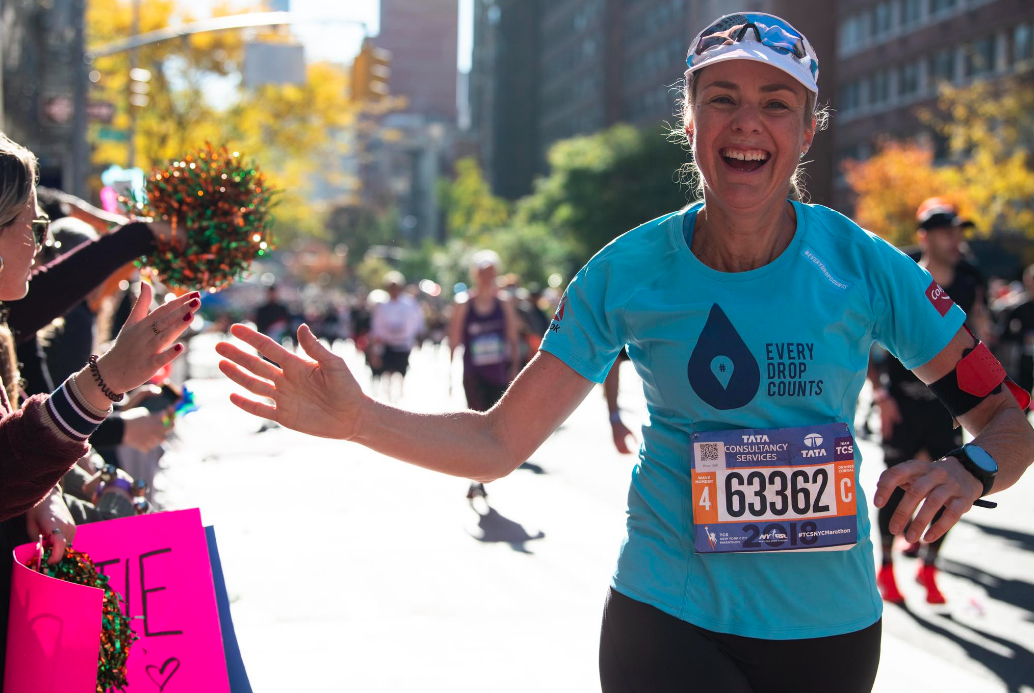
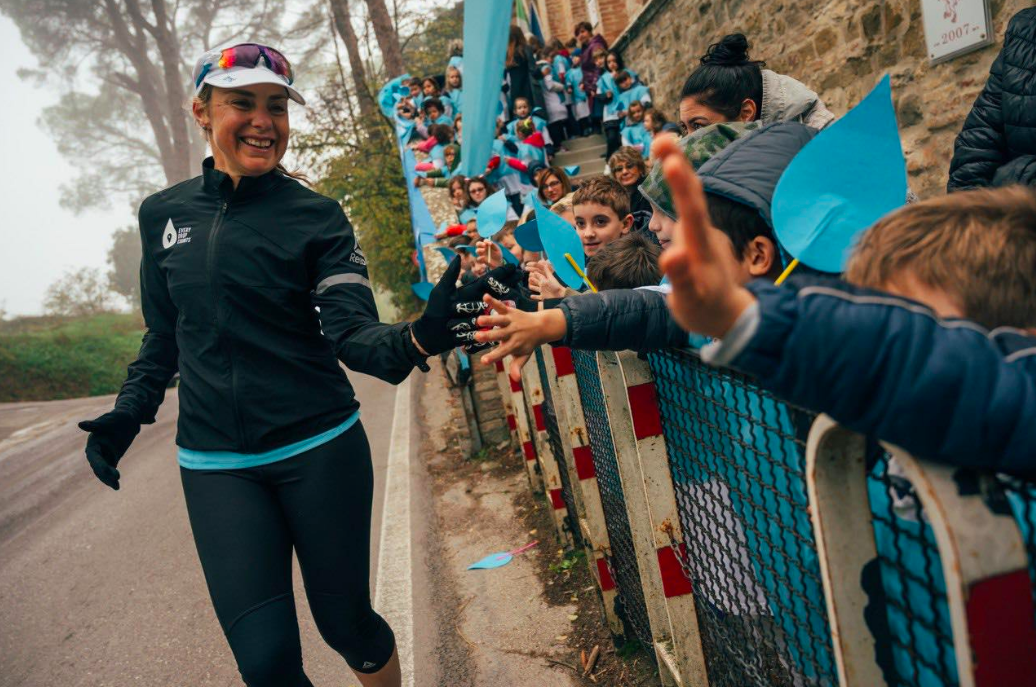
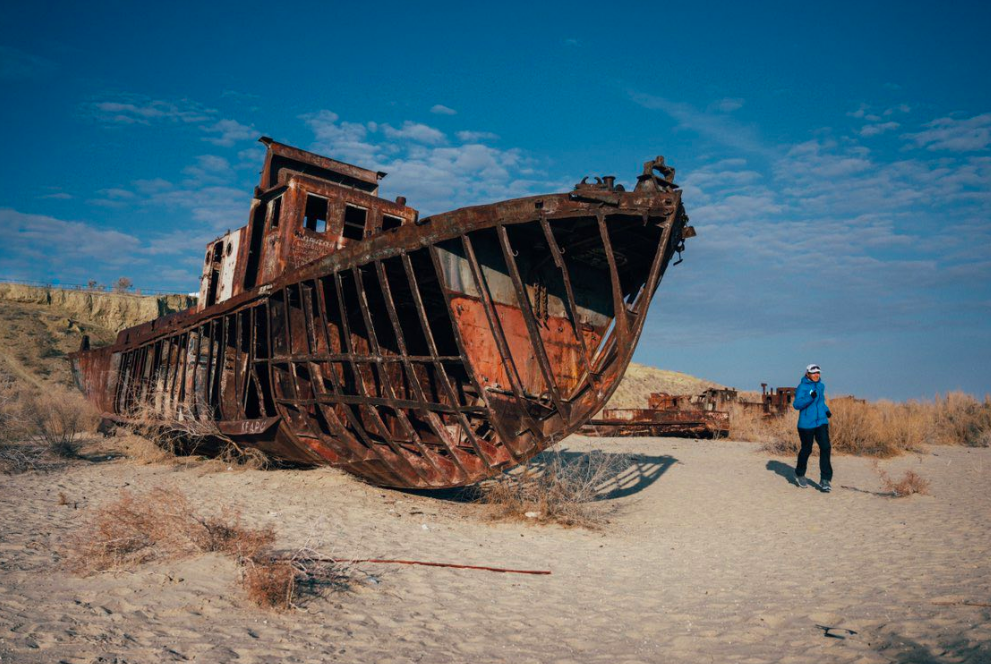
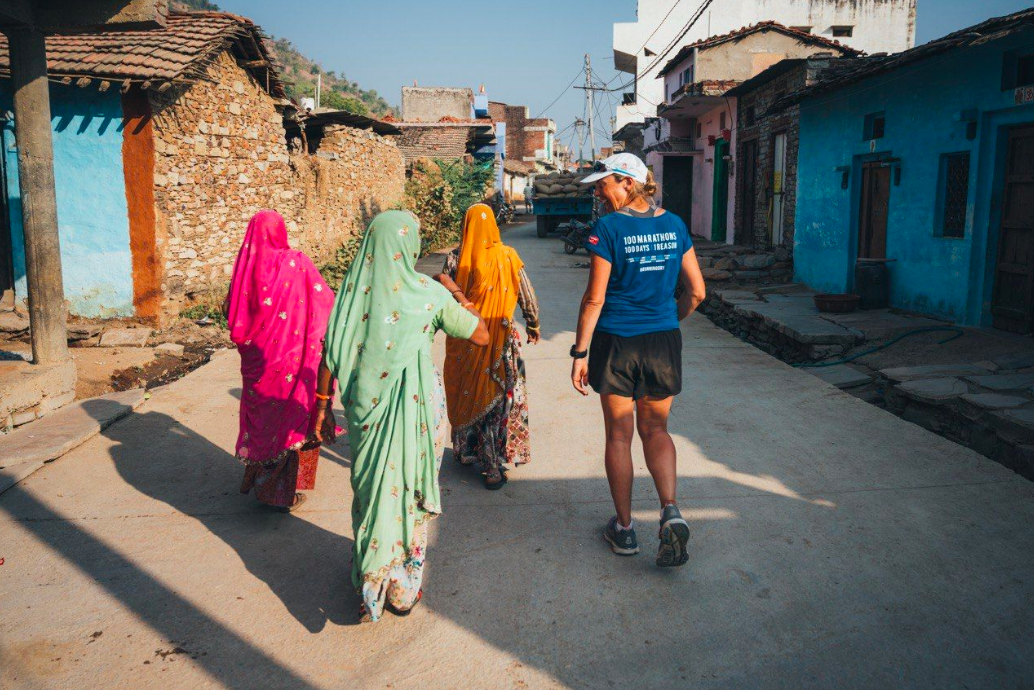
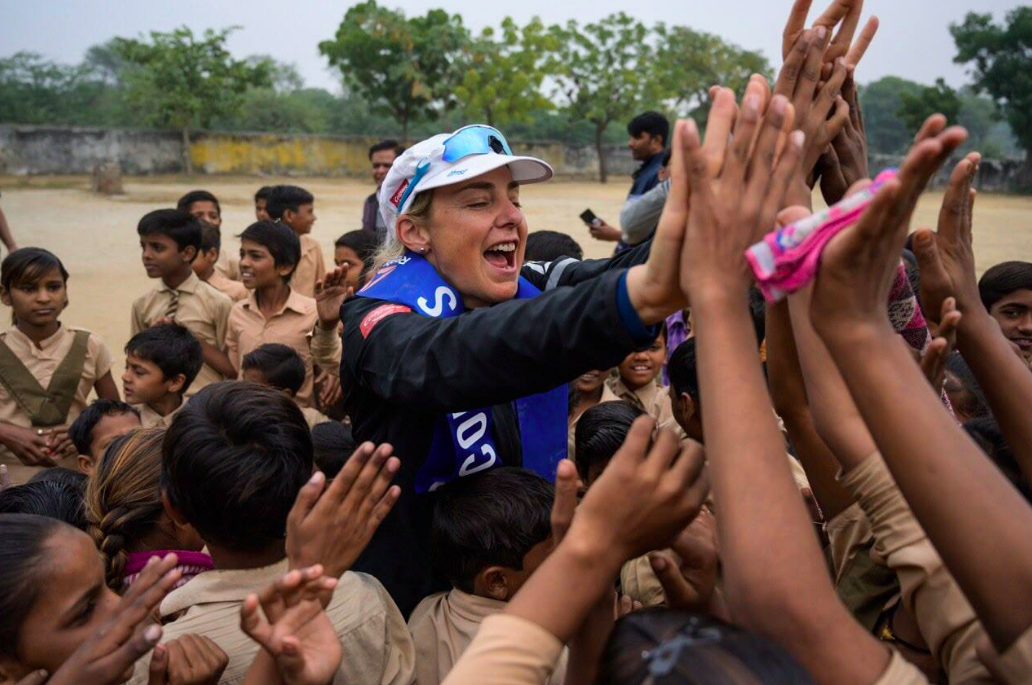
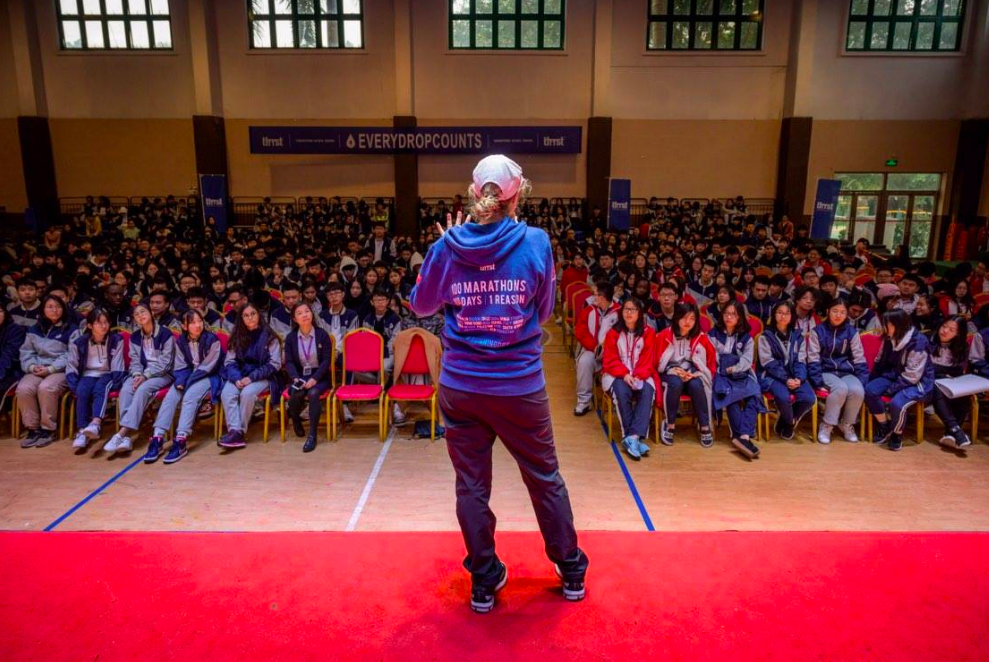
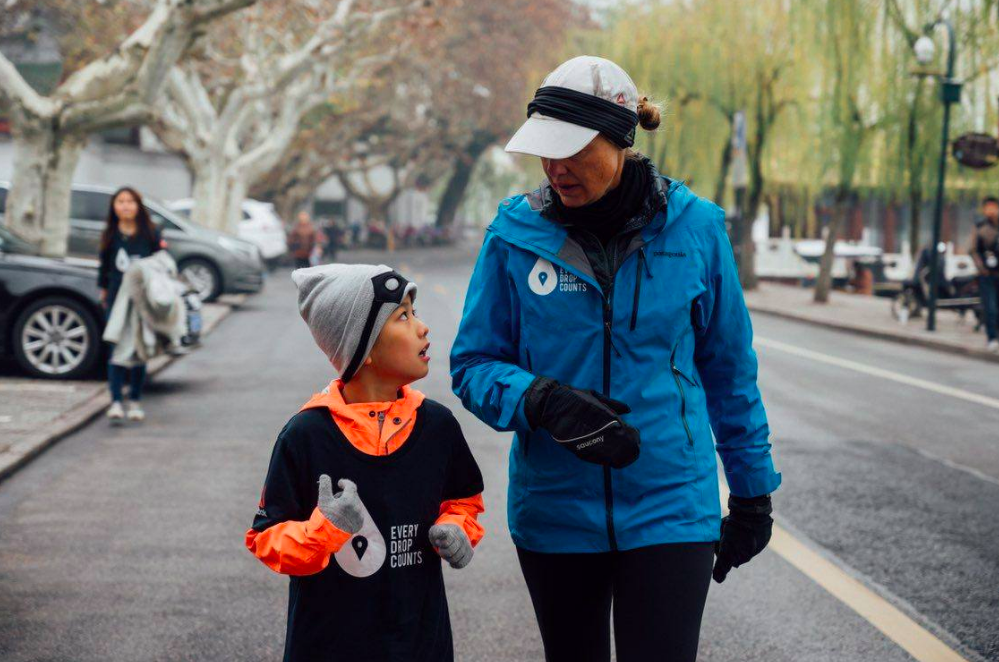
Photos: Kelvin Trautman
A team of storymakers
To sustain interest and build momentum over 100 days, it was really important to develop a content plan with built-in surprises, highlights and spectacular images. From Treeshake, we had Dave Duarte as Campaign Director; Bridget McNulty as Creative Director; Jaidan Rumboll as Community Manager; and Kelly Burke as Global PR lead.
Mina would be travelling with photographer Kelvin Trautman and videographer Jared Paisley. So, the first task was to find places for Mina to run that told the story, and would look good on camera. We also identified “water heroes” for her to meet along the way, and created infographics with key facts and tips about invisible water - the huge amount of water that goes into producing our food and clothing without us even being aware of it.
The Water Heroes turned out to be a key driver of the success of the campaign. We identified the most influential people in water in each of the locations Mina was due to run, and decided to celebrate one water hero every day with a blog post and tweet. This was a lot of work, but was one of the hidden drivers of the success of the campaign. The water heroes gave us insider info, and many also became active supporters on social media.
Production is one thing, gaining attention is another. A campaign on this scale needs teams with local media contacts. Four international PR consultancies were hired to support the campaign - Fenton in the US; Fleishman Hillard in China; Frank PR in Australia; and Bubble Communications in India. These agencies gave us access to local media and helped us navigate the cultural nuances of international PR and media, which tends to differ regionally.
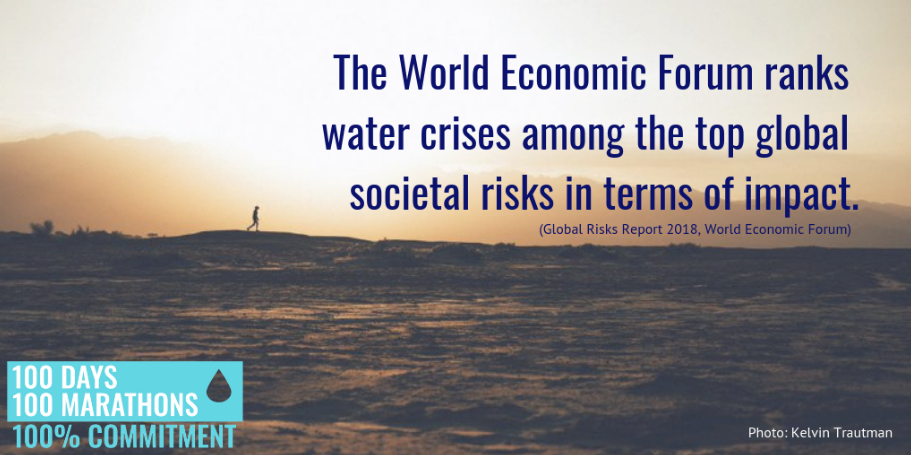
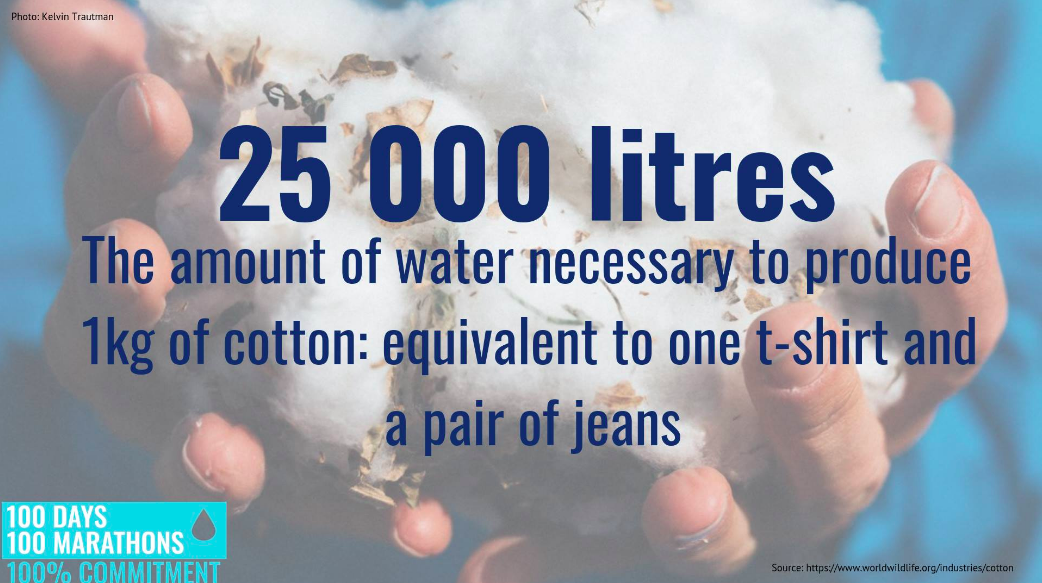
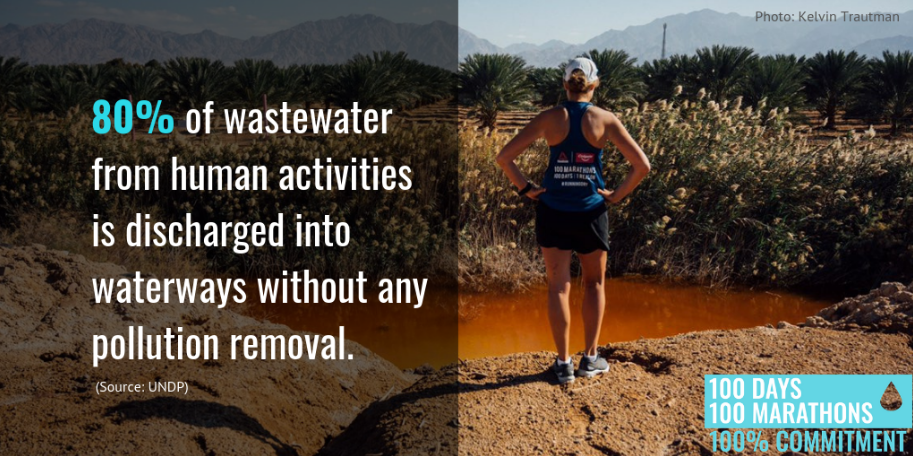
100 day logistics
The ground team travelled far, and fast, with Mina running a marathon every single day. Starting at the New York City Marathon on 4th November 2018, the team went across Europe (UK, France, Italy), Uzbekistan, India, China, Hong Kong, Dubai, the Middle East (Jordan, Palestine, Israel), South Africa, and Australia before crossing over to the USA and finishing the 100-day journey back where they started in New York on the 11th of February 2019. What this meant, logistically, is that often Mina would fly to a new country overnight, do media on arrival, drive a few hours to meet a water hero, and then run. A whole marathon. The schedule alone was a feat of endurance.
This would not have been possible without our brilliant and accomplished Chief of Staff, Melanie Ho who handled ALL the logistics - a daunting task considering the amount of travel, equipment, permits and more that needed to be arranged.
This kind of travel is not cheap, but was made possible by headline sponsors Reebok and Colgate. It was important to position the campaign and the sponsorship arrangement in a way that both benefited the sponsors and added to the campaign narrative. This was, and is, key to Mina’s campaigning model. To quote a New York Times piece about the campaign.
“Guli, 48, is part of a class of runners now picking up sponsorships the same way top-level runners coming out of college do. They won’t be winning the Boston Marathon or Olympic medals, but they offer something that shoe brands want to be a part of at a time when the top of the podium isn’t the only spotlight… Reebok and other companies are going after unique narratives they hope will inspire people.
Video: Jared Paisley
Consistently high social engagement
It was a gruelling pace, but right from the start the stories we were able to tell - on Facebook, Instagram, Twitter and Mina’s blog were beautiful, and heartbreaking. The global water crisis was being shown in true human form, and we were getting respectable numbers of video views organically. With attention to detail in ensuring that each community member felt appreciated and heard, social media engagement rates rose and were consistently higher than the norm. For example:
Facebook: 2.3% (Average Facebook engagement rate: 0.5%-1%)
Instagram: 7.9% (Average Instagram engagement rate: 2%)
Twitter: 1.7%. (Average Twitter engagement rate: 0.9%-1%)
With engagement growing, our focus on narrative, influencer partnerships, and community engagement was really paying off. By this stage Mina’s accounts had grown from around 10 000 followers to around 50 000 followers in the space of two months, we’d had respectable media coverage online, on radio, TV, and print. By all accounts it was going excellently.
An unexpected twist
Around marathon 50 Mina began walking her marathons, and they were taking more than 12 hours a day to complete. We decided to cancel her Ethiopian runs, as the relentless travel was also taking a toll. She came to South Africa and took an MRI, which verified what the whole team had feared: Mina had multiple stress fractures in her femur. Mina revealed this to the #RunningDry community in an honest video and series of photographs that many supporters said was a refreshing break from the airbrushed perfection of social media. She spoke to them person to person, sharing her vulnerability and despair at being injured.
While this was unfolding, Beaufort West, a town in the Western Cape of South Africa, literally ran dry. As terrible as this was, it was an opportunity to show the world what we were saying. Limping along, Mina joined local disaster relief organisation Gift of the Givers on the ground to donate water to the residents. It was a heartbreaking and powerful few days, and we told the story far and wide on local and international media. And then, Mina couldn’t go on.
Mina ran 62 marathons in 62 days, but on day 63 she was told by doctors that if she ran any more she would never run again. In fact, the fractures had grown since the time of her first MRI - she ran so hard she broke her leg.
As devastated as she was, we knew this was story gold. And so we kept asking the question “How does this make things better?” - an important question to consider in almost any crisis.

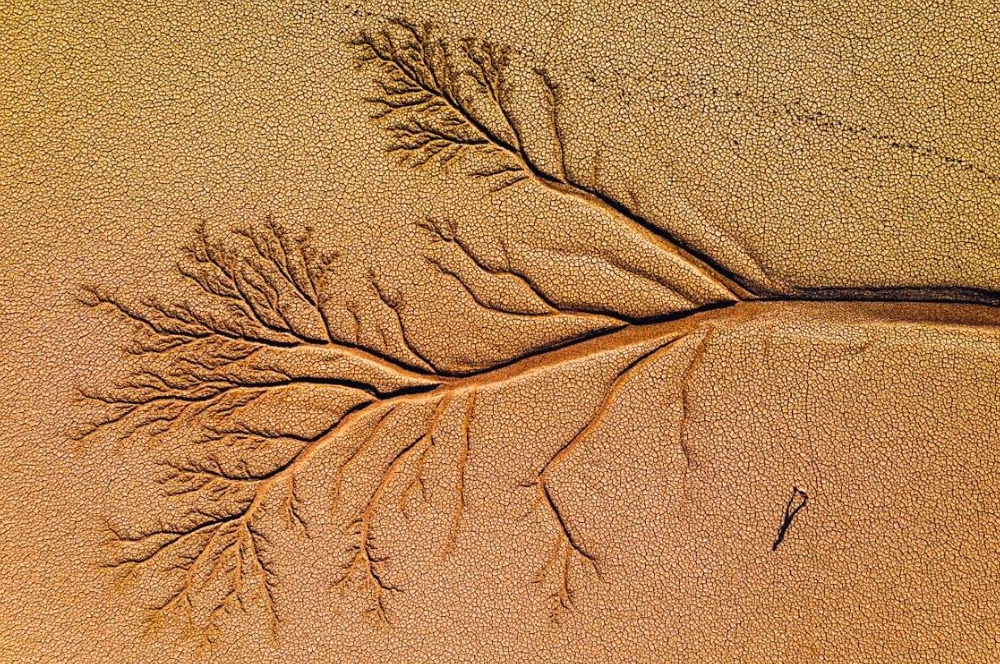
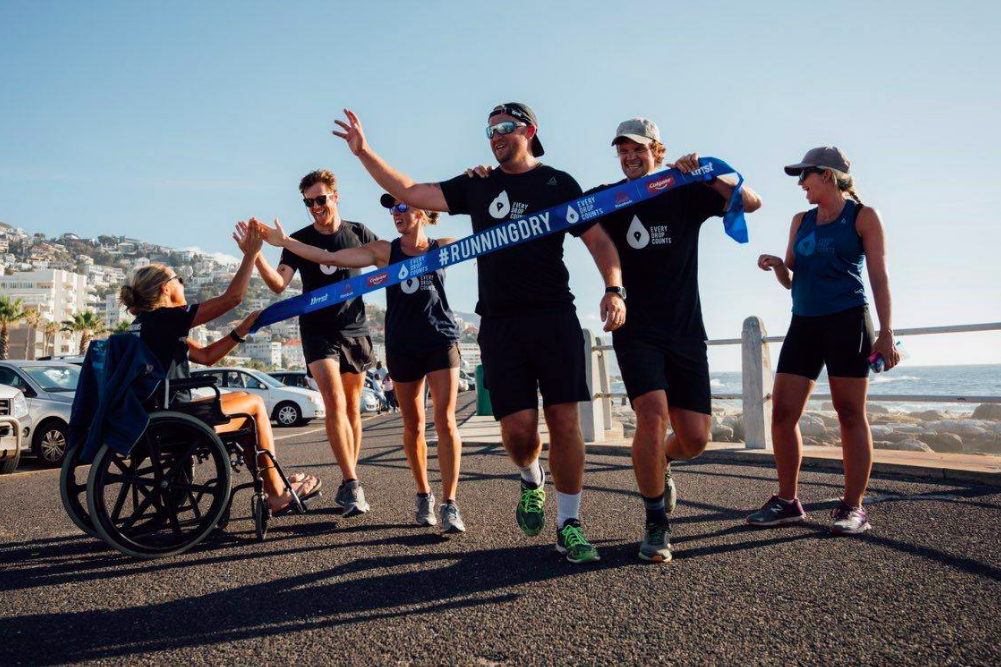
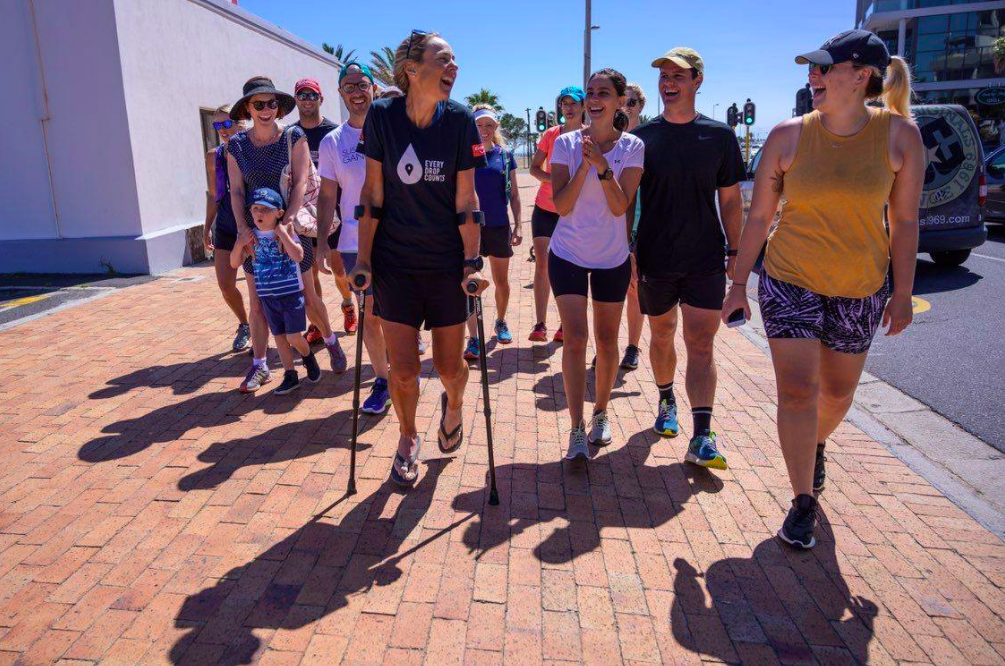
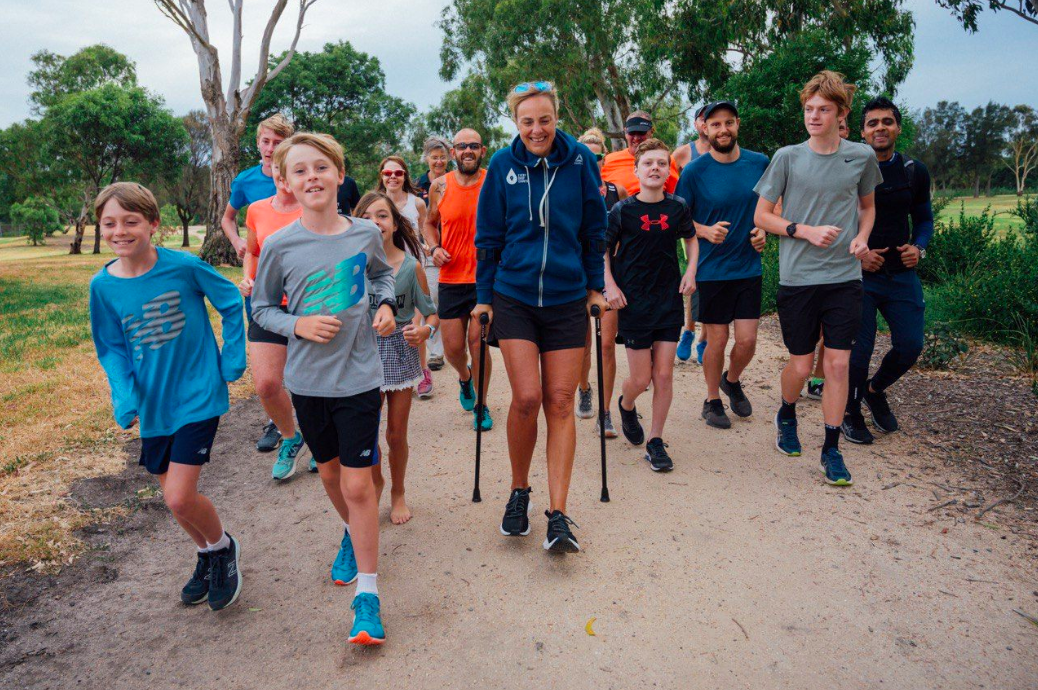
Photos: Kelvin Trautman
Campaign to movement
A few of Mina’s supporters had commented on her injury video, saying they wished they could run a marathon for her. We took this community led idea as our strategic cue, and realised this was how we would turn crisis into opportunity.
This was the point in the hero’s journey where the mentor would be needed to guide the hero through the transition. Lewis Pugh has played this role for both Treeshake and Mina and we asked him for his advice and support to help us all through this transition in the campaign and the story. He met Mina at the hospital and advised her that it was time to let others pick up the baton.
Starting off with a team run, we introduced the idea of Mina’s supporters completing her daily marathon for her. There was a lot of discussion about the dynamics of how we’d track success, and it was decided ultimately that we wouldn’t ask people to run full marathons but rather tally up ALL contributions - whether 1km or 100kms in a day.
The first follower was Bruno Sanchez from Madrid, who ran a full marathon for Mina as soon as the request was put out. That same day, we mobilized supporters in Cape Town, where Mina was that day, to contribute kilometres to the cause. The images and story were picked up by the Associated Press worldwide, and from there the #RunningDry movement began
A real community
Our team worked hard to make sure every single person who contributed distance to #RunningDry felt validated, and noticed. We replied to every comment, reached out on DM to thank people, and shone a spotlight on the community who was not only doing Mina’s distance for her, but also sharing water facts and helpful tips along the way.
To incentivise and acknowledge the community we also provided a daily tally of miles, posted on Twitter, which listed every person who contributed and ranked their distance. This proved to be a key motivator for people who contributed, as they knew that every extra mile they put in was being counted and made a difference in showing the scale of our movement.
Even though we’d only set out to log one marathon a day, hundreds of people were contributing runs that far exceeded this target. It was then that the next dream was born: Mina had set out to run 100 marathons in 100 days for water, what if the #RunningDry community ran 100 marathons in 1 day to show the power of collective action?
100 marathons in 1 day
We started working on the idea - reaching out by Direct Message to anyone who had contributed miles and asking for their support in the challenge, creating a special page on Mina’s website explaining exactly what to do, adding a pop-up so that anyone who visited the site would know about the marathon attempt. We set up a folder of easily shareable infographics on Facebook and punting the water saving messages we wanted to promote, and to let people know that we could only achieve this if we all worked together. On Sunday 27th January 2019, we attempted 100 marathons in 1 day, and we were blown away.
Mina’s vision for the 100 marathons in 100 days #RunningDry campaign was simple: to make saving water famous. Just over 2 weeks after announcing her injury on social media, the vision became a reality with #RunningDry becoming a worldwide movement.
As of midnight on the 27th of January, 251 marathons had been logged: an incredible distance of 10,629.3km. People donated kilometres from 44 different countries and territories - from Antarctica to Sweden, Mexico to Japan, Australia to Serbia and everywhere in between. Supporters logged distances from 1km to over 50km, in temperatures from -15°C to over 40°C, in deserts, snow and in forests. People ran by rivers and others by oceans and waterways. Some ran in cities and on tracks. Some ran in groups and others on their own. But every single one of them donated their miles on Sunday to support #RunningDry and help drive global water awareness.
Results
The reach of this campaign has been phenomenal. Press releases were picked up by the Associated Press multiple times and pushed to print, TV and radio around the world. The total online audience, according to Critical Mention, is 1,590,084,059 and growing daily. The estimated media value is currently sitting at over $100 million.
The rapid growth of the community online has been equally gratifying. Mina’s social media pages gained 232,506 new followers and fans throughout the campaign - with 24,830 new followers in just one week building up to the #RunningDry “100 marathons in one day” activation we did in late January.
There was an outpouring of positive comments and water facts shared, with users around the world taking to social media to share why they were running for water.
Finally, in April 2019 the United Nations selected the campaign as a top 3 finalist in their annual SDG Action Awards.
This documentary produced by ABC about Mina and the campaign tells the whole story and is well worth watching:
#PowerFutures: Fuelling discussion about South Africa’s energy transition
PowerFutures is a think tank dedicated to a just energy transition in South Africa. We produced a video to help launch the project that was seen by over 25 000 people in a day, and that has helped open doors to further media engagement and ongoing influence.
Energy is central to economic development, growth, and the achievement of the SDGs. And yet in South Africa, our energy sector operates on an old model that is holding the country back. Ahead of the 2019 State of the Nation Address, a new conversation was needed to fuel discussion and mobilise support for bold reform.
Working with a brand new account, called Power Futures SA, we were tasked with raising the level of discussion about the urgent need for reform ahead of Davos, the ANC NEC meeting, and ultimately the 2019 State of the Nation Address.
We love a challenge, and what made this campaign remarkable was that we were given one week from briefing to build the brand, define the messaging, gather the community, and get our content in-front of the key decision-makers at these events.
Kickstarting the Conversation with Video
Articles about Eskom are written every day in the media, so to get noticed and join the public conversation on this important topic we launched with a video entitled “South Africa’s Democratic Energy Transition”. This video was scripted for a very specific audience of senior policy-makers in government and at Eskom, who we ensured saw it via chat groups and direct messages on WhatsApp.
To launch the video we worked with UCT Graduate School of Business to pull together a panel of leading commentators on South Africa’s energy future. We also created a social media toolkit with talking points* which we sent directly to event participants and influential social media users.
The result was 25 000 views of the video on launch day with more than 10 separate pieces of media coverage, including the most read article of the week on Fin24 “Eskom: Breaking up is hard to do, but it may be necessary - experts”.
The stage was set, and the PowerFutures team were well positioned for ongoing engagement on the unbundling of Eskom and ensuring a “just transition” for South Africa’s energy sector.
Changing the Narrative
In a field as complex as energy there are multiple stakeholder groups, with competing perspectives on the issue of unbundling of the national energy utility. A common metaphor was needed to frame the issue and inform how it was discussed.
Our expert client likened it to having “all our eggs in one basket” - in other words, we need to diversify the risk of having a centralised power utility without any backup plan. This was the key line that we used to pitch and place a powerful op-ed, developed with Jasandra Nyker - a highly respected and influential voice in renewables. The piece, entitled ”All the eggs are in Eskom’s basket: It is time to diversify the energy sector “, was agenda setting both in terms of the content quality, the timing, and who penned it.
Within days key politicians and leaders were using the metaphor: “all our eggs are in Eskom’s basket, if it drops our economy breaks.” This powerfully framed the situation, made it easy to understand, and paved the way for the decision to unbundle the power utility.
This helped inform more targeted discussion about the “unbundling” of Eskom, in other words - to remove all our eggs from one basket. And within a month of the campaign Eskom announced plans to break up into three entities, paving the way for more sustainable power generation and hopefully an end to load-shedding.
UPDATE
While the announcement happened quickly, Eskom’s cogs turn a lot more slowly. A Daily Maverick exclusive in October 2022 announced that the ailing power utility is “moving full steam ahead” with unbundling into Transmission, Generation and Distribution divisions.
*Talking Points
The South African government aims to reduce coal’s share of total capacity from almost 80% in 2017 to 46% by 2030. The government also announced new plans to quadruple renewable energy’s share of capacity to 36% in 2030.
South Africa has one of the highest per capita emissions ratings in the developing world, accounting for more than 40% of Africa’s total coal-derived CO2 emissions.
Among the G20‚ South Africa’s thermal coal use is the highest and its use of renewable energy is the second-lowest.
In 2008, Eskom held an A1 investment grade credit rating. Last year, ratings agency Standard & Poor’s maintained Eskom’s rating at CCC+. Several levels deep into junk territory (and with a negative outlook).
Power Futures is an initiative of UCT Graduate School of Business















